#QURANIC VERSES ABOUT RAMADAN AND FASTING
Text

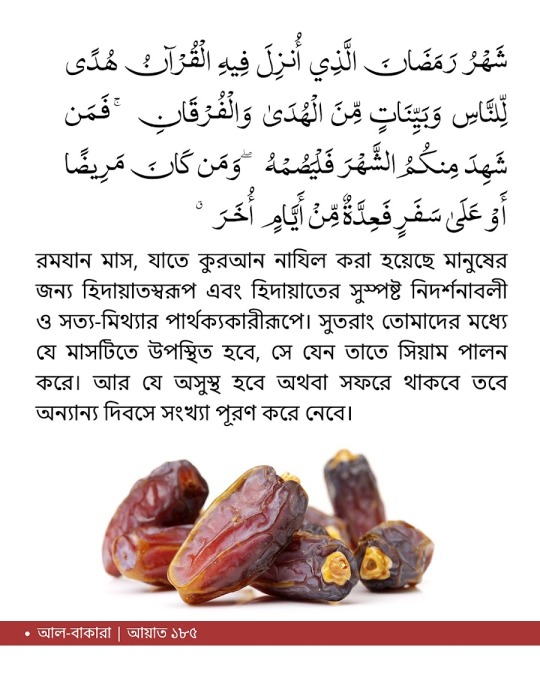
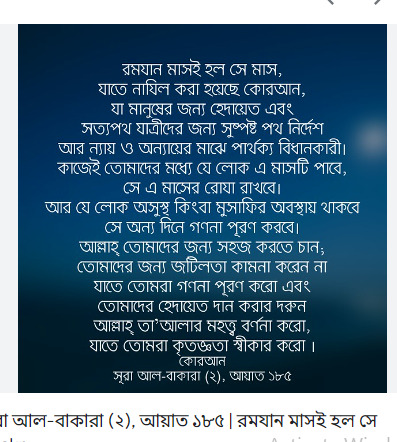
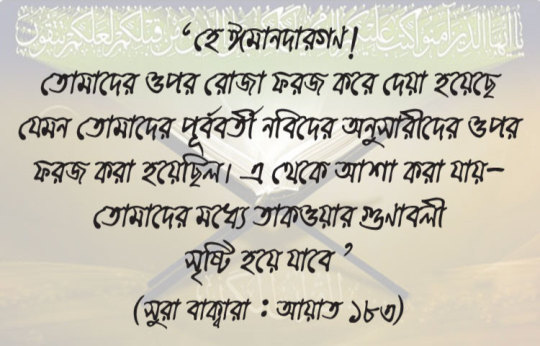
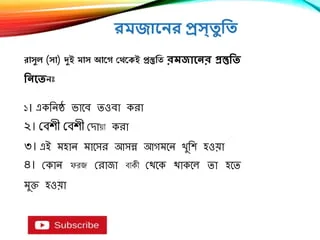

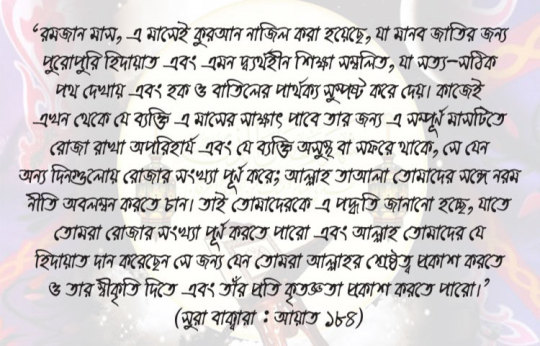
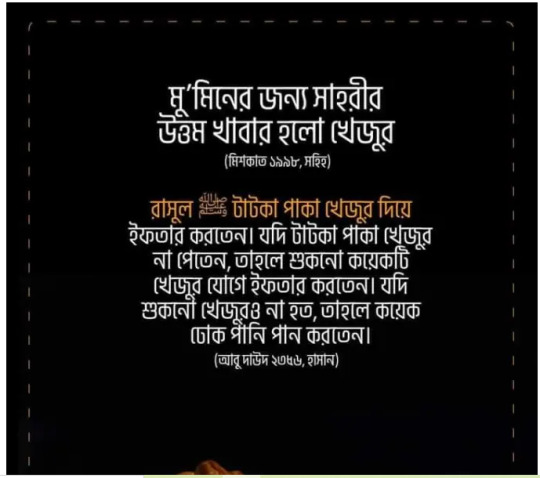
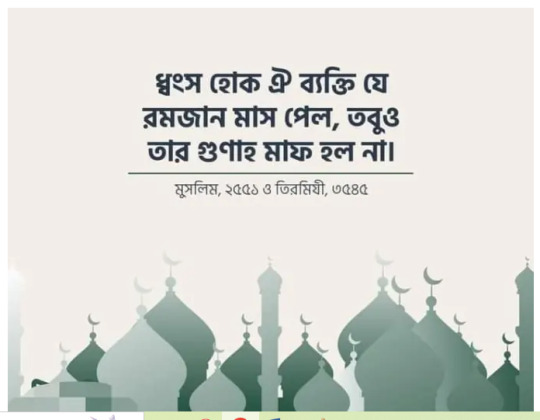
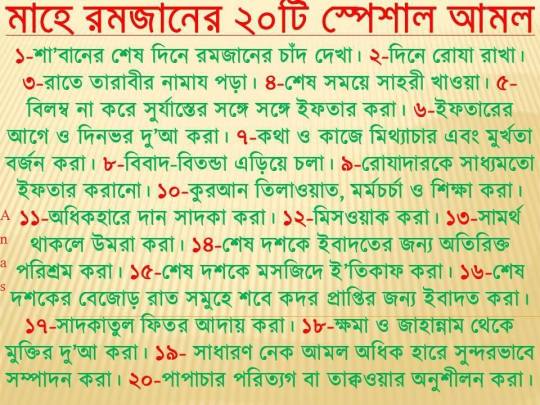
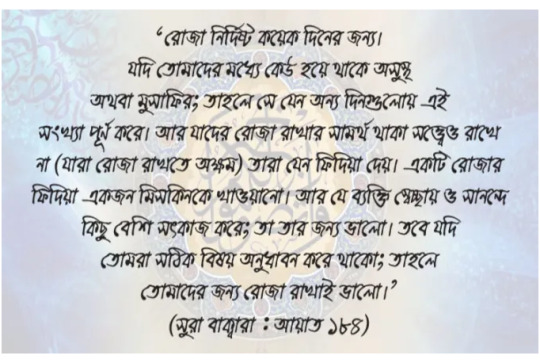

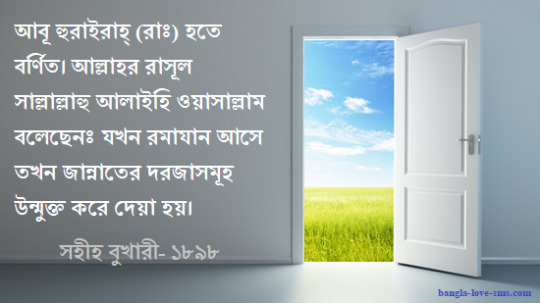
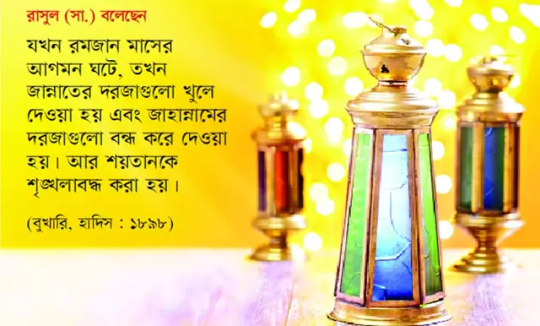
রমজান মাস সার্থক করতে আমল
রমজান মাস মুসলমানদের জন্য আল্লাহর তরফ থেকে এক বিশেষ রহমত স্বরূপ। কোরআন এবং হাদীসে এই রমজান সম্পর্কে সুস্পষ্ট বিধান রয়েছে।
প্রতিটি সক্ষম মুসলমান নর-নারীর ওপর এই মাসে রোজা বা সিয়াম সাধনা বাধ্যতামূলক করা হয়েছে, একই সঙ্গে এর অসংখ্য ফজিলত বর্ণনা করা হয়েছে কোরআন ও হাদীসে।
এক রেওয়াতে বর্ণনা করা হয়েছে, রোজাদারের পুরস্কার স্বয়ং আল্লাহ পাক প্রদান করবেন। অন্য এক হাদীসে বর্ণনা করা হয়েছে রোজা মুমিনের জন্য ঢাল স্বরূপ।
এই রমজান মাস আল্লাহর তরফ থেকে বান্দার জন্য রহমত, বরকত ও মাগফেরাত হিসেবে অভির্ভূত হয়।
হাদীস(সহীহ বোখারী, সহীহ তিরমিযি, ইমাম হাম্বলী, ইবনে কাসীর, প্রভৃতিবর্ণিত রয়েছে, বিশেষ করে সাহাবী ক্কাআব বিন ঊজাইর রাজি আল্লাহু তাআলা আনহু (রা.) থেকে বর্ণিত, একবার জুমার খুৎবা দেওয়ার জন্য রাসূলুল্লাহ সাল্লাল্লাহু আলাইহি ওয়াসাল্লাম (সা.) যখন মিম্বরের প্রথম সিঁড়িতে পা রাখেন, তখন বলেন আমীন, দ্বিতীয় সিঁড়িতে যখন পা রাখেন, তখন বলেন আমীন, একইভাবে তৃতীয় সিঁড়িতে পা রেখেও বলেন, আমীন।
কুরআনের কোন আয়াতে রোজা সম্পর্কে বলা হয়েছে?
কুরআনে। কুরআনে রোজা পালনের কথা বলা হয়েছে। আয়াত 2:183- এ, কুরআন এমন পরিস্থিতি প্রকাশ করে যেখানে একজন মুসলমানকে উপবাস থেকে বিরত থাকার অনুমতি দেওয়া হয় এবং অভাবী লোকদের খাওয়ানোর মতো বিকল্প সমাধানের প্রবর্তন করে।
রমজানের প্রস্তুতি
youtube
রমজানের ৬-৭দিন আগে রাসুল সাঃ যে আমল করতেন এবং যে আমল থেকে বিরত থাক��েন!
youtube
#রমজান মাস সঙ্ক্রান্ত আয়াত
#রমজান এবং রোজা সম্পর্কে কুরআনের আয়াত
#রমজান এবং রোজা সম্পর্কে কুরআনের আয়াত
রমজান মাসের আমল
রমজানের প্রস্তুতি
QURANIC VERSES ABOUT RAMADAN AND FASTING
Verses of Fasting and Ramadan
#ramadan#fasting#রমজান মাসের আমল#রমজানেরপ্রস্তুতি#QURANIC VERSES ABOUT RAMADAN AND FASTING#QURANICVERSES#RAMADAN#FASTING#Verses of Fasting and Ramadan#Qur'an#LailatulQadr#কুরআন#রমজান#রোজা#লাইলাতুলকদর#RamadanPreparation#Ramadan Month#Verses#monthofRamadan#Ramadan#Fasting#রমজানমাস#Youtube
0 notes
Text
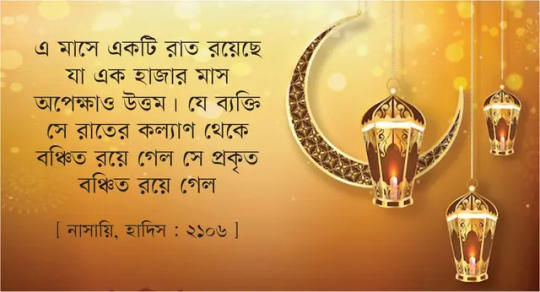

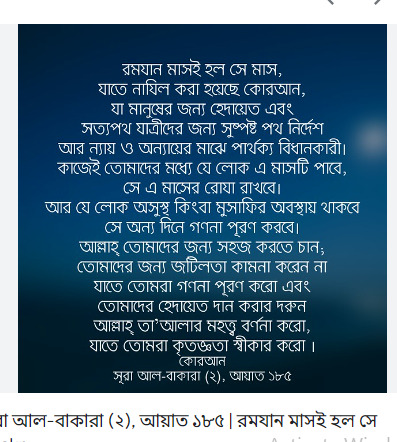
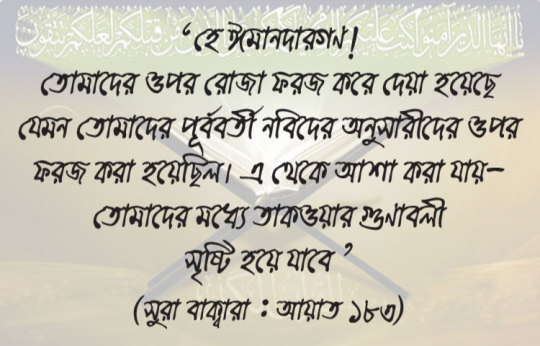


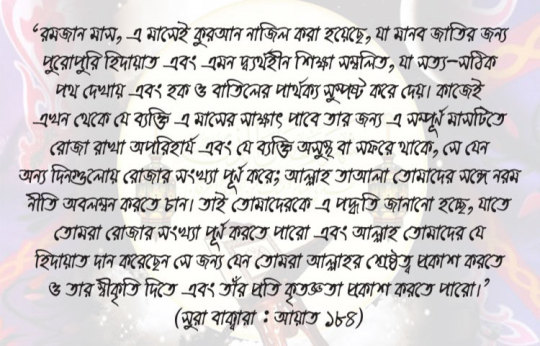
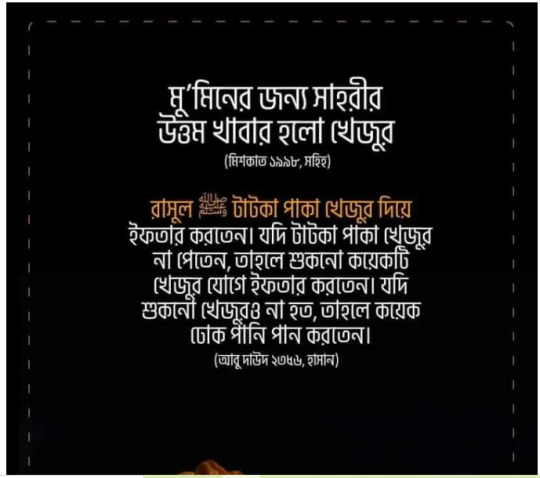
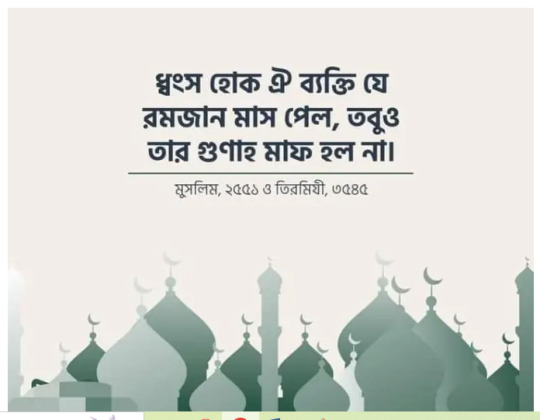
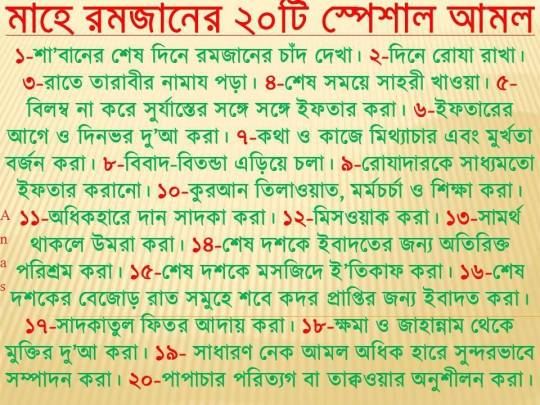
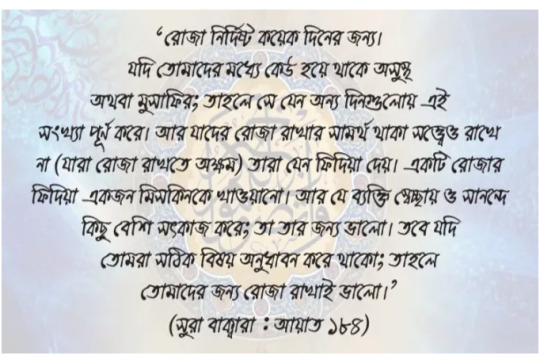
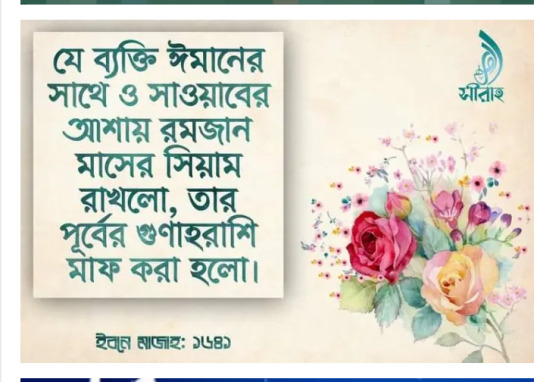
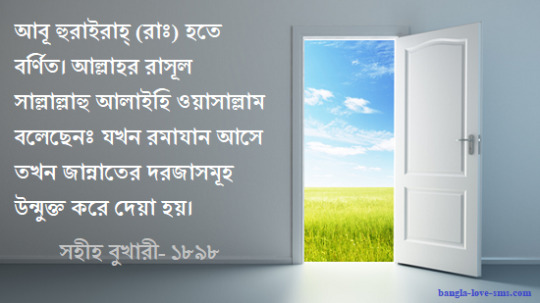
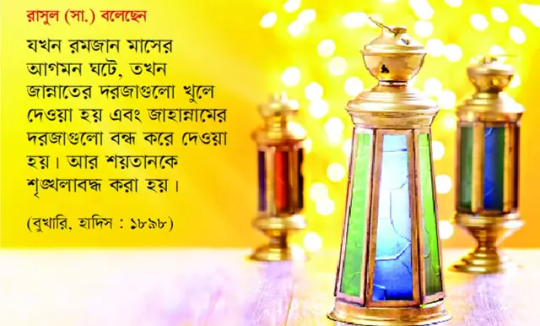
রমজান মাস সার্থক করতে আমল
রমজান মাস মুসলমানদের জন্য আল্লাহর তরফ থেকে এক বিশেষ রহমত স্বরূপ। কোরআন এবং হাদীসে এই রমজান সম্পর্কে সুস্পষ্ট বিধান রয়েছে।
প্রতিটি সক্ষম মুসলমান নর-নারীর ওপর এই মাসে রোজা বা সিয়াম সাধনা বাধ্যতামূলক করা হয়েছে, একই সঙ্গে এর অসংখ্য ফজিলত বর্ণনা করা হয়েছে কোরআন ও হাদীসে।
��ক রেওয়াতে বর্ণনা করা হয়েছে, রোজাদারের পুরস্কার স্বয়ং আল্লাহ পাক প্রদান করবেন। অন্য এক হাদীসে বর্ণনা করা হয়েছে রোজা মুমিনের জন্য ঢাল স্বরূপ।
এই রমজান মাস আল্লাহর তরফ থেকে বান্দার জন্য রহমত, বরকত ও মাগফেরাত হিসেবে অভির্ভূত হয়।
হাদীস(সহীহ বোখারী, সহীহ তিরমিযি, ইমাম হাম্বলী, ইবনে কাসীর, প্রভৃতিবর্ণিত রয়েছে, বিশেষ করে সাহাবী ক্কাআব বিন ঊজাইর রাজি আল্লাহু তাআলা আনহু (রা.) থেকে বর্ণিত, একবার জুমার খুৎবা দেওয়ার জন্য রাসূলুল্লাহ সাল্লাল্লাহু আলাইহি ওয়াসাল্লাম (সা.) যখন মিম্বরের প্রথম সিঁড়িতে পা রাখেন, তখন বলেন আমীন, দ্বিতীয় সিঁড়িতে যখন পা রাখেন, তখন বলেন আমীন, একইভাবে তৃতীয় সিঁড়িতে পা রেখেও বলেন, আমীন।
কুরআনের কোন আয়াতে রোজা সম্পর্কে বলা হয়েছে?
কুরআনে। কুরআনে রোজা পালনের কথা বলা হয়েছে। আয়াত 2:183- এ, কুরআন এমন পরিস্থিতি প্রকাশ করে যেখানে একজন মুসলমানকে উপবাস থেকে বিরত থাকার অনুমতি দেওয়া হয় এবং অভাবী লোকদের খাওয়ানোর মতো বিকল্প সমাধানের প্রবর্তন করে।
রমজানের প্রস্তুতি
youtube
রমজানের ৬-৭দিন আগে রাসুল সাঃ যে আমল করতেন এবং যে আমল থেকে বিরত থাকতেন!
youtube
#রমজান মাস সঙ্ক্রান্ত আয়াত
#রমজান এবং রোজা সম্পর্কে কুরআনের আয়াত
#রমজান এবং রোজা সম্পর্কে কুরআনের আয়াত
রমজান মাসের আমল
রমজানেরপ্রস্তুতি
QURANIC VERSES ABOUT RAMADAN AND FASTING
#ramadan#Fastiing#Youtube#রমজান মাসের আমল#রমজানেরপ্রস্তুতি#QURANIC VERSES ABOUT RAMADAN AND FASTING#QURANICVERSES#RAMADAN#FASTING#Verses of Fasting and Ramadan#Qur'an#LailatulQadr#কুরআন#রমজান#রোজা#লাইলাতুলকদর#RamadanPreparation#Ramadan Month#Verses#monthofRamadan#Ramadan#Fasting#রমজানমাস
0 notes
Text
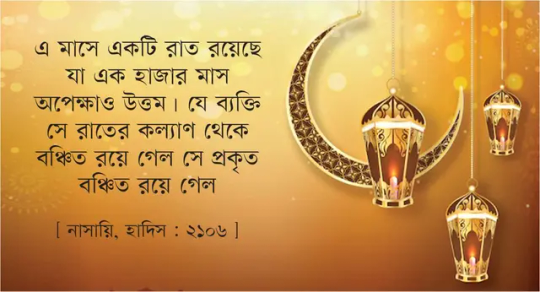

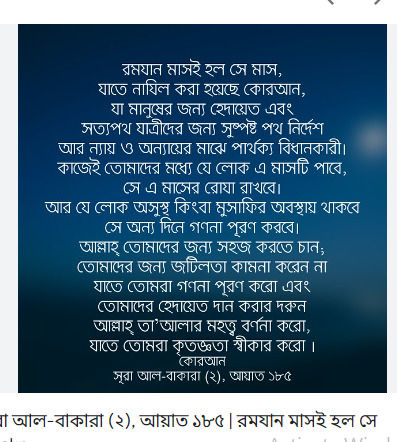

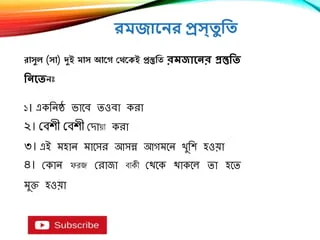

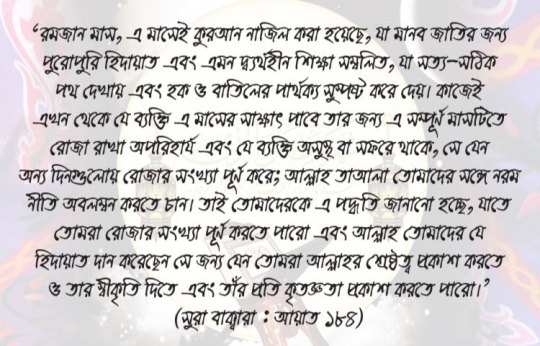

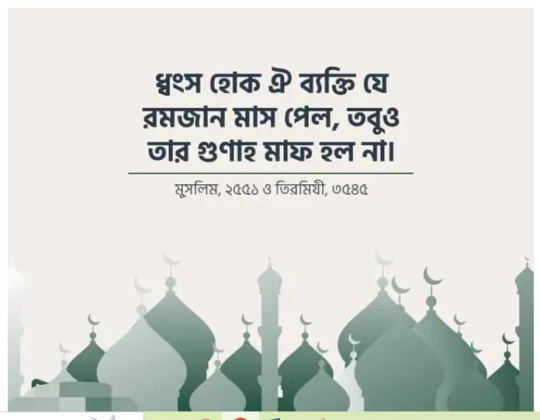

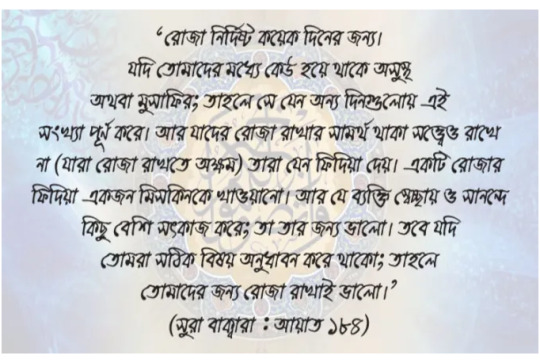
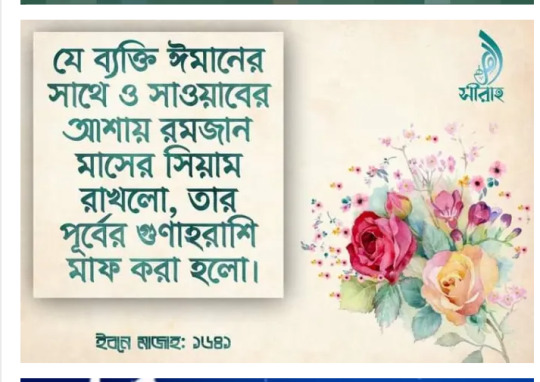
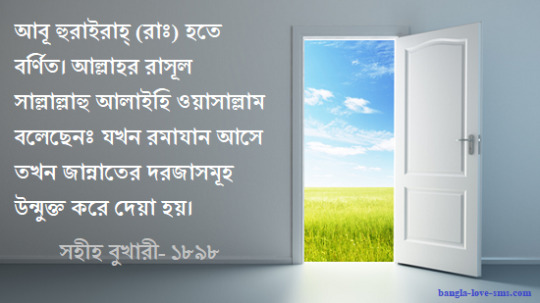
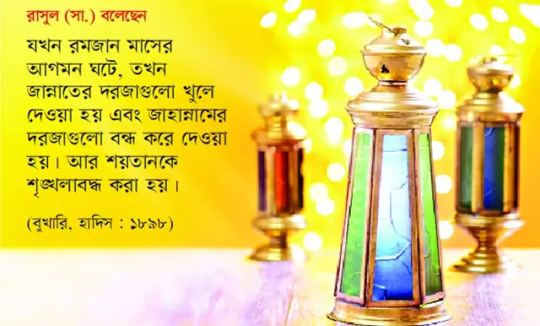
রমজান মাস সার্থক করতে আমল
রমজান মাস মুসলমানদের জন্য আল্লাহর তরফ থেকে এক বিশেষ রহমত স্বরূপ। কোরআন এবং হাদীসে এই রমজান সম্পর্কে সুস্পষ্ট বিধান রয়েছে।
প্রতিটি সক্ষম মুসলমান নর-নারীর ওপর এই মাসে রোজা বা সিয়াম সাধনা বাধ্যতামূলক করা হয়েছে, একই সঙ্গে এর অসংখ্য ফজিলত বর্ণনা করা হয়েছে কোরআন ও হাদীসে।
এক রেওয়াতে বর্ণনা করা হয়েছে, রোজাদারের পুরস্কার স্বয়ং আল্লাহ পাক প্রদান করবেন। অন্য এক হাদীসে বর্ণনা করা হয়েছে রোজা মুমিনের জন্য ঢাল স্বরূপ।
এই রমজান মাস আল্লাহর তরফ থেকে বান্দার জন্য রহমত, বরকত ও মাগফেরাত হিসেবে অভির্ভূত হয়।
হাদীস(সহীহ বোখারী, সহীহ তিরমিযি, ইমাম হাম্বলী, ইবনে কাসীর, প্রভৃতিবর্ণিত রয়েছে, বিশেষ করে সাহাবী ক্কাআব বিন ঊজাইর রাজি আল্লাহু তাআলা আনহু (রা.) থেকে বর্ণিত, একবার জুমার খুৎবা দেওয়ার জন্য রাসূলুল্লাহ সাল্লাল্লাহু আলাইহি ওয়াসাল্লাম (সা.) যখন মিম্বরের প্রথম সিঁড়িতে পা রাখেন, তখন বলেন আমীন, দ্বিতীয় সিঁড়িতে যখন পা রাখেন, তখন বলেন আমীন, একইভাবে তৃতীয় সিঁড়িতে পা রেখেও বলেন, আমীন।
কুরআনের কোন আয়াতে রোজা সম্পর্কে বলা হয়েছে?
কুরআনে। কুরআনে রোজা পালনের কথা বলা হয়েছে। আয়াত 2:183- এ, কুরআন এমন পরিস্থিতি প্রকাশ করে যেখানে একজন মুসলমানকে উপবাস থেকে বিরত থাকার অনুমতি দেওয়া হয় এবং অভাবী লোকদের খাওয়ানোর মতো বিকল্প সমাধানের প্রবর্তন করে।
রমজানের প্রস্তুতি
youtube
রমজানের ৬-৭দিন আগে রাসুল সাঃ যে আমল করতেন এবং যে আমল থেকে বিরত থাকতেন!
youtube
#রমজান মাস সঙ্ক্রান্ত আয়াত
#রমজান এবং রোজা সম্পর্কে কুরআনের আয়াত
#রমজান এবং রোজা সম্পর্কে কুরআনের আয়াত
রমজান মাসের আমল
রমজানের প্রস্তুতি
#ramadan#রমজান মাসের আমল#রমজানেরপ্রস্তুতি#QURANIC VERSES ABOUT RAMADAN AND FASTING#QURANICVERSES#RAMADAN#FASTING#Verses of Fasting and Ramadan#Qur'an#LailatulQadr#কুরআন#রমজান#রোজা#লাইলাতুলকদর#RamadanPreparation#Ramadan Month#Verses#monthofRamadan#Ramadan#Fasting#রমজানমাস#fasting#Youtube
0 notes
Text

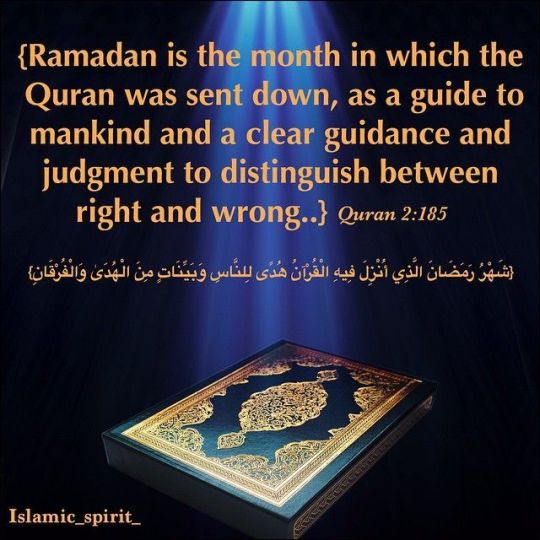
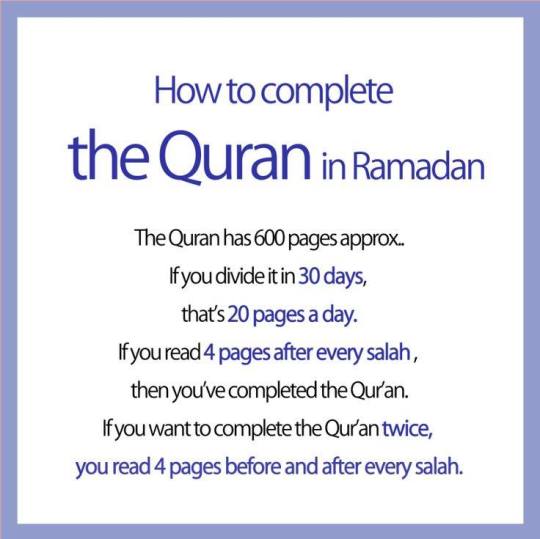
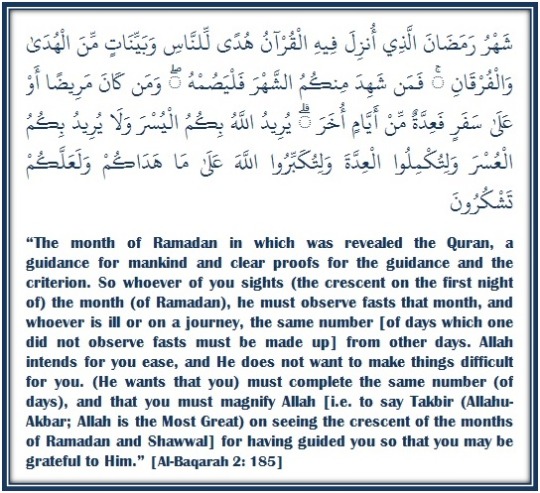





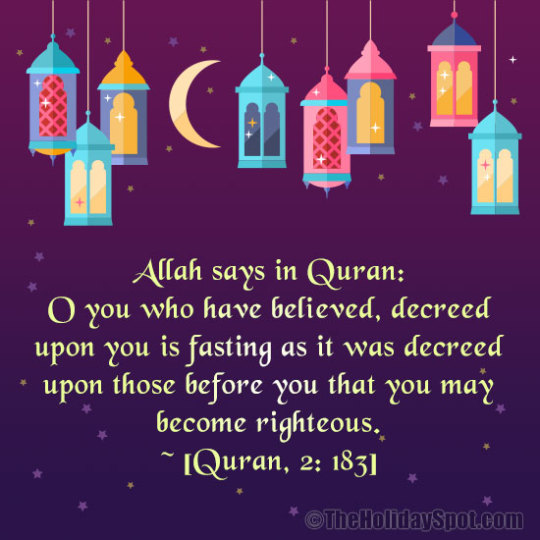


Which Quran verse talks about fasting?
In the Quran. In the Quran, the practice of fasting is mentioned. In verse 2:183, the Quran expresses situations in which a Muslim is allowed to abstain from fasting and introduces alternative solutions such as feeding needy people.
Which surah of Quran to read in Ramadan?
Since Ramadan is the month of the Qur'an, it is the perfect time to recite these Surahs, build a connection with them and even memorise them. You can listen to three of these 'Gems of the Qur'an' here: Surah Yasin, Surah Waqi'ah and Surah Mulk.
Surah Baqarah Ayah 185. The month of Ramadhan [is that] in which was revealed the Qur'an, a guidance for the people and clear proofs of guidance and criterion. So whoever sights [the new moon of] the month, let him fast it; and whoever is ill or on a journey – then an equal number of other days.
Verses about Ramadan
https://www.youtube.com/watch?v=ppqt8nLL-fs
https://www.youtube.com/watch?v=5TgveVWYRFQ
https://www.youtube.com/watch?v=LABS6xwNUaE
Fasting is Compulsory in Ramadhaan
https://www.youtube.com/watch?v=7tx7AOvTUPA
PHYSICAL AND PSYCHOLOGICAL BENEFITS OF FASTING
https://www.youtube.com/watch?v=Oc9n9spADUw
QURANIC VERSES ABOUT RAMADAN AND FASTING
Verses of Fasting and Ramadan
#ramadan#QURANIC VERSES ABOUT RAMADAN AND FASTING#Verses of Fasting and Ramadan#RamadanPreparation#Verses about Ramadan#Ramadan Month#Verses#monthofRamadan#Ramadan#Fasting#QURANICVERSES#RAMADAN#FASTING#Qur'an#LailatulQadr#কুরআন#রমজান#রোজা#লাইলাতুলকদর#islam
0 notes
Text
tips for writing muslim characters
except im a muslim, born and raised
dont mix it up with arab characters, yes a muslim can be arab and muslim but theres a difference. the link to my post abt writing arabs is here
first and foremost, not all muslims are arabs, and not all arabs are muslims. yes, most terminology and the holy book is in arabic, but that doesnt mean its exclusively arabs
indonesia (not an arab country) has the highest population of muslims worldwide
the arab country with the most christians is egypt, but the arab country with the highest population of christians is lebanon
not all practicing muslim women wear hijab (some extremely religious women might not wear a hijab)
five prayers a day: fajr (before sunrise), zuhr (midday), asr (afternoon), maghreb/maghrib (sunset), ishaa (nighttime)
call to prayer is known as 'azan', you can listen to it on youtube
muslims use the lunar calendar (known as the hijri calendar), which also has 12 months but its around two weeks shorter than the gregorian calendar. most people only remember the ninth month: ramadan
fasting consists of not eating/drinking from fajr until maghrib. you stop as soon as the azan for fajr sounds, and you can start again as soon as the azan for maghrib sounds. you fast for the entire month of ramadan, but its also encouraged to fast on mondays, thursdays, and the 14th/15th/16th days of each month of the hijri calendar
allah isnt the name of god. allah is the arabic word for 'god'
women dont have to cover up completely until puberty, athough some girls cover up before then and other women dont cover up at all
women can be religious and not cover up
the word 'hijab' doesnt show up in the quran, its 'khimar'. hijab is to cover up completely, not just hair. you cant wear a headscarf with a short sleeved shirt
men have to cover up too. from their navel to their knees absolutely has to be covered up, and (in most islamic cultures, not necessarily exactly religious) they cover up their chests as well
also men are told to avert their gazes from women more than women are told to cover up. youd find a lot of men in muslim countries not looking up from the floor when walking, especially in areas w a lot of women
kids by the age of eight can usually recite at least four chapters from the quran (the first one and the last three, mostly. it doesnt matter if theyre not arab)
if you want to use verses from the quran for whatever reason, i recommend quran.com
theres only one version of the quran. the same copy thats existed for 1400 years and millions of people have memorized it
on that note, people who memorize the quran are called hafiz, and there isnt a particular age. theres a three year old hafiz and a woman who didnt memorize it until age eighty three
there are two different sources for islamic law: the quran (holy book), and hadith (quotes of the prophet). dua' is completely different, its a prayer used to ask help from god, but unlike the five prayers, it doesnt really require a specific ritual. you just sit, face the direction of mecca, and say the dua'
superstitions are haram, but muslims do believe in black magic (its sihr in arabic and its one of the biggest sins) and djinn (there are djinn muslims but theyre widely regarded somewhat like monsters who encourage/help you to do black magic)
allahu akbar means "god is greater" or "god is the greatest". it isnt used as a signal to blow people up, and it isnt a term used purely by islam extremists
assalamu aleikum / waaleikum assalam mean, respectively, "peace be upon you" and "and peace be upon you too" basically just our way of just saying "hi" along with the reply
subhanallah means "glory be to god" usually when witnessing a miracle or when amazed
mashaallah - there arent any exact english equivalents but it means "what god wills". usually for compliments or to protect someone from evil eye
insha'allah - simply "god willing" but we use this when talking about the future (like "will you come to school?" "insha'allah" or "we'll get the gift, right?" "insha'allah"). can be replaced by the lesser used "bi'ithn illah"
alhamdu lillah - "praise be to god" or "thanks be to god. used in the way you might imagine, but also as a way to express that youre doing fine. "how are you doing today, sister?" "alhamdu lillah" (also when finishing a meal / finishing drinking water)
astaghfir ullah - "i seek forgiveness from god" whenever we see someone do something haram or when we ourselves do something haram and wish to repent
bismillah - "in the name of god" we use this whenever we begin something. a lot of arab literature starts with this. every chapter im the quran starts with this. every meal starts with saying this before eating
you can submit asks if you have any questions, but try to be a lil specific !!
feel free to rb with more info :)
#writing tips#muslim#writing muslims#writer sources#writing help#writers on tumblr#writeblr#writing advice
151 notes
·
View notes
Text
Day 2
Disclaimer: I am not a scholar or a professional who studies religion. The points I am giving are just some snippets from the Quran which I found interesting. If you want to know more about the context, I'd suggest you to read the Quran—or maybe the tafsir (explanation) in your native language.
Juz' 2
• Further explanation about history of the qibla (direction towards Kaaba in Mecca, which is used by Muslims as the directiom of prayer for the salah).
• Allah tests and tries His servants.
• Sa'i (ritual of walking back and forth seven times between two small hills of Safa and Marwa).
• The order to eat halal things and explanation of what is prohibited and what is not.
• The order to practice qisas ("eye for an eye") and wasiat (a will before death).
• The order to practice fasting during Ramadan.
• The command to fight those who fight muslims. This is said to probably be the most misquoted verse from the Quran.
• Command to complete Hajj (pilgrimage to Mecca) and Umrah.
• Prohibition of khamr (alcoholic drink) and gambling.
• Charity and who has the rights to receive it.
• Prohibition of sexual intercourse with menstruating women.
• About divorce.
• Command that prayer should be performed properly and on time.
• Story of Prophet Shammil (Samuel) and Israelites and King Talut (Saul), and how Prophet Dawud (David) killed Jalut (Goliath).
8 notes
·
View notes
Text
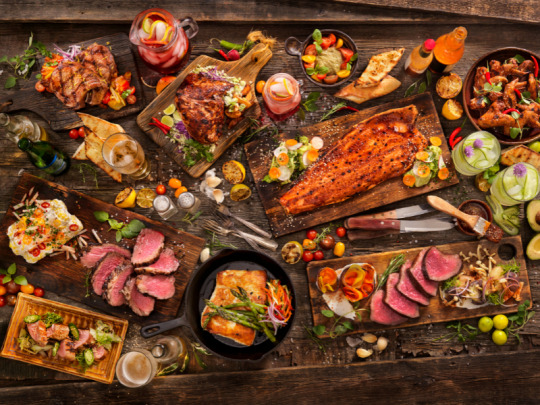
Spring has finally sprung in these parts with the vernal equinox transpiring at 11:06pm on Tuesday, as the Earth’s upright tilt bequeathed us with a virtually identical length of day and night. From this point on, we can expect to bask in an extra three minutes of glorious sunlight per day here in the northern hemisphere.
As we burst forth from our metaphorical hibernation into the warmth of the accelerating sunshine, the spring season is welcomed as a time of renewal, rebirth and fresh beginnings. Thanks to this year’s mild winter, a springtime rejuvenation is already underway at our bustling farmstalls with several early arrivals like tender pea shoots, frilly lettuce and leafy bok choy trickling onto the scene.
Coinciding with the advent of spring is a confluence of significant cultural and religious holidays that are each associated with traditional meals, reflecting their distinct geographic affiliations and historical foodways. Fortunately, your local Down to Earth farmers market remains well-stocked with plenty of trusty winter stalwarts, as well as some early season newcomers, for you to incorporate in your springtime feasts and celebratory dishes both this weekend and next.
Purim Seudah
The festival of Purim will take place from sundown this Saturday through sundown on Sunday. Purim is a joyous, fun and lively holiday commemorating Queen Esther’s saving of the Jewish people of ancient Persia by preventing their annihilation at the hands of Haman, King Ahasuerus’ wicked prime minister. Purim is typically observed by readings of the biblical book of Esther (Megillah), making charitable donations, sharing gifts of food with friends, and partaking in a special festive seudah banquet with loved ones.
It’s customary to serve foods at the Purim seudah that are inspired by symbolic links to the Megillah. Queen Esther is said to have eaten a vegetarian diet in order to keep kosher while living in her husband King Ahasuerus’s palace. Thus, Purim menus worldwide typically feature an array of beans, seeds, legumes, nuts and dried fruits. Feed directly into this ancient tradition with a generous platter of crudité featuring ready-cut celery, carrots, radishes and other crunchy veggies from 4E Green Farm to dip in a tub of Taiim Shack Mobile’s seasonally flavored, creatively crafted hummus. Like Queen Esther, hummus hails from the Middle East where it’s traditionally made by blending chickpeas with tahini, lemon juice and garlic. Or how about a dish of pre-seasoned, ready-to-cook lentils from The Lentil Co. who've taken the work out of preparing lentils so you can enjoy a relaxed and delicious seudah with your family.
Iftar Ideas
Ramadan occurs during the ninth month of the Islamic calendar when it’s believed the first verses of the Holy Book of Quran were sent down from heaven and revealed to the Prophet Muhammad. This holiest of month for Muslims began on March 12th this year and is a time for fasting, introspection, prayer, and performing acts of charity and kindness.
Ramadan fasting is one of the five pillars of Islam and requires abstaining from food and drink from sunrise to sunset. Iftar is the fast-breaking evening meal that customarily commences with a bite of a fresh or dry date then moves onto a feast of traditional foods. This simple and tasty Chicken Shawarma recipe makes a fortifying iftar given its combination of nutritious and satiating ingredients that are easily sourced from the farmers market during the seasonal transition.
Ingredients
2 tablespoons garlic paste (Great Joy Family Farm garlic blended in a food processor with olive oil or water)
¾ cup extra virgin olive oil, divided
2 teaspoons kosher salt
Spices (1 tablespoon each of turmeric, cinnamon, freshly ground black pepper, cumin, smoked spicy paprika)
1½ tablespoons lemon juice
2½ pounds Roaming Acres or Yellow Bell Farm boneless chicken thighs or breasts, cut into 1-inch strips
1 large Jersey Farm Produce white onion, thinly sliced
Pita bread from Taiim Shack Mobile and/or 4E Green Farm bibb lettuce
4E Green Farm red cabbage, sliced
Torn cilantro, parsley and mint from Jersey Farm Produce
Harissa sauce
Easter Feasts
Easter, also called Pascha or Resurrection Sunday, is a Christian festival and cultural holiday commemorating the resurrection of Jesus on the third day after his Crucifixion. After attending a church service, Easter Sunday is traditionally celebrated over a large meal featuring meat, potatoes, vegetable side dishes and dinner rolls.
In preparation for next week’s Easter extravaganza, Down to Earth meat vendors will bring holiday ham, pastured chicken and spring lamb; the farmstalls will have plenty of root veggies and fresh greens; and our chocolate and baked goods vendors will make specialty items such as decorated holiday-themed cookies.
To wrap things up as we warmly embrace the outset of spring, there’s no shortage of occasions and reasons to head to your farmers market this weekend. We’ll have a diverse abundance of seasonally appropriate items for you to bring to the table at whatever event or holiday it is that you may be celebrating. We look forward to seeing you at the market!
#downtoearthmkts#farmersmarket#eatlocal#shoplocal#buylocal#localfood#farmersmarkets#eatdowntoearth#purim 2024#ramadan 2024#easter 2024#foodways#springtime
0 notes
Text
"Throwing Down." From Surah Seven, Al Araf, "The Heights."

Ramadan day 9
We don't know very much about the Recitation of the Quran by Allah to Gabriel and Gabriel to the Prophet, Muhammad the Quraysh.
The only reference to it is in Al Baqarah:
During the month of Ramadan the Qur'an was sent down as a guidance to the people with Clear Signs of the true guidance and as the Criterion (between right and wrong). So those of you who live to see that month should fast it, and whoever is sick or on a journey should fast the same number of other days instead.
We know God wants us to be able to tell what is right from what is wrong as the result of a more intense period of study of the Book, and that He intends this understanding to be permanent. This means everything we are learning now has to become Islam, the Straightest Way. One cannot read the Quran and discover Allah told Muhammad "do not fight" and then fight. This is called the Crooked Path and those who disbelieve and disobey will burn in hell.

Fasting - everyone fasts during Ramadan, but why? Is it to become pure for the receipt of the Holiness of the Quran?
Transmutation into Gematria reveals what this means:
And God Said Let There Be An Expanse Between The Waters To Seperate Water From Water So God Made The Expanse The Water Under The Expanse From The Water Above It And It Was So.
The Value In Gematria Is 12776, ויבזז "And I will loot."
The very same words that are found in the opening of the Book of Genesis. So Ramadan is indeed a sign from God to start At the Beginning. Not to retread the same old scripture looking for new meaning, but to use its Course to navigate the fastest way out of oppression and violence and poverty to a life rich in the bounty Allah promised Muhammad all believers were entitled to.
Most importantly, we now know who Allah is, why He gave Muhammad the Quran and who the world's practitioners of Islam are in the process. Our task now is to live by it. Do not listen to that shuttlecock in Iran he is an idiot. He is a walking talking rectum.

Read the Quran and discover the real voice behind the Script and let Interpol carry the wee bitch off to prison where he belongs.
7:148-151.
In the absence of Moses, his people made from their ˹golden˺ jewellery an idol of a calf that made a lowing sound. Did they not see that it could neither speak to them nor guide them to the ˹Right˺ Path? Still they took it as a god and were wrongdoers.
Later, when they were filled with remorse and realized they had gone astray, they cried, “If our Lord does not have mercy on us and forgive us, we will certainly be losers.”
When Moses returned to his people, ˹totally˺ furious and sorrowful, he said, “What an evil thing you committed in my absence! Did you want to hasten your Lord’s torment?”
Then he threw down the Tablets and grabbed his brother by the hair, dragging him closer. Aaron pleaded, “O son of my mother! The people overpowered me and were about to kill me. So do not ˹humiliate me and˺ make my enemies rejoice, nor count me among the wrongdoing people.”
Moses prayed, “My Lord! Forgive me and my brother! And admit us into Your mercy. You are the Most Merciful of the merciful.”
Commentary:
What kind of man prays to God for mercy and then cuts people into bits? What kind of Muslim country does this?

People are not jewelry, they cannot speak for God or act like Him if they do not experience the Mercy of God and govern mercifully in His Place. Just as the opening of the Torah and the inaugurating verse for Ramadan state= mercy parts the waves, it is what separates the light from the darkness, it is what starts the ball of civilization rolling.
The Values in Gematria expound upon this further:
v. 148: In the absence of Moses, his people made from their ˹golden˺ jewellery an idol of a calf. Muhammad begins his Account of the first sin of the people of Israel after they left captivity. They wanted instant gratification. This was a mistake.
The Value in Gematria is 8563, חהוג, "a circle." Muhammad said the thing could not speak, but a real prophet can:
O you who have believed, be persistently standing firm in justice, witnesses for Allah, even if it be against yourselves or parents and relatives. Whether one is rich or poor, Allah is more worthy of both. So follow not [personal] inclination, lest you not be just. And if you distort [your testimony] or refuse [to give it], then indeed Allah is ever, with what you do, Acquainted. (Qur’an 4:135)
v. 149: Later, when they were filled with remorse and realized they had gone astray, they cried. The Value in Gematria is 13162, יגאוב, yagaub= they wanted God to dote on them.
v. 150a: When Moses returned to his people, ˹totally˺ furious and sorrowful, he said, “What an evil thing you committed in my absence! Did you want to hasten your Lord’s torment?”
The Value in Gematria is 12188, יבאחח , "I will be proud."
v. 150b: Then he threw down the tablets and grabbed his brother by the hair. The name Aaron means "center of cheer." Aaron was permitting a popularity contest between himself and Moses to make himself happy. When Moses grabbed Aaron's hair, he demonstrated what a liability that popularity ended up being.
Why did Moses threw the tablets down? The Value in Gematria is 10300, יגאֶפֶסאֶפֶס, igapesapes, "You missed! Thrirteen will be Zero, Zero will be Zero."
Proud men who want to be popular that do not understand the Law, contained in the Quran, the Torah, and the Gospels become despots like Satan Claus up above. Wise men realize you can get every ounce of power, every penny of wealth and influence just as easily by being loved rather than hated. People are willing to do whatever it takes for leaders they love. They will plot and scheme against despots who will never sleep a wink at night knowing their people seethe for revenge against them.
Without a Godly man leading a country, a company, or a temple, the rest are zero. A man who knows God, however, is a gold mine for his people:
v. 151: Moses prayed, “My Lord! Forgive me and my brother! And admit us into Your mercy. You are the Most Merciful of the merciful. The Value in Gematria is 7011, זאֶפֶסאא, zepesa, "he climbed."
Moses threw down the tablets because the people sinned before they were told they were committing a sin. The two sets of tablets represent how one is first told about the law and is expected to obey, either by doing what is expected or avoiding what is prohibited when the opportunity arises.
To mature without incurring sin, is called "the climb" by the Torah. Statesman, public servants, and clergy are expected to be climbers- persons who do not sin or need to ask for forgiveness. Now that we know for sure the Quran is an authentic prophecy dictated by a real God to a real prophet, all believers who are observing Ramadan will be able to start their climb.
Let's begin the Climb by "throwing down" an oath! Let's be like Moses and promise to put an end to any slavery left in this world.
That means by the end of Ramadan Mubarak there will be no more traces left of the Republican Party, the Mormons, Vladimir Putin, Ayatollah Khamenei, Hezbollah, Hamas, or Muhammad Bin Salman. Let us pledge to close the curtain on all tyrannies by this time.
Allāh will not impose blame upon you for what is meaningless1 in your oaths, but He will impose blame upon you for [breaking] what you intended of oaths. So its expiation2 is the feeding of ten needy people from the average of that which you feed your [own] families or clothing them or the freeing of a slave. But whoever cannot find [or afford it] - then a fast of three days [is required]. That is the expiation for oaths when you have sworn. But guard your oaths.3 Thus does Allāh make clear to you His verses [i.e., revealed law] that you may be grateful.
Everyone we set free will be grateful and so will we. We will follow the Quran literally! This is the perfect Ramadan Recipe for a happy Eid al Fitr and the beginning of Masjid.
0 notes
Text
Ramadan 2024: Fasting Hours And Iftar Times Around The World
The Dawn-To-Dusk Fast Lasts Anywhere From 12 to 17 Hours, Depending on Where in the World You Are.
— By AJLabs | 7 March 2024 | Al-Jazeera

Following the sighting of the crescent by the moon-sighting committee, Saudi Arabia has announced that the first day of fasting will be Monday, March 11.
The dawn-to-dusk fast lasts anywhere from 12 to 17 hours, depending on which part of the world you are in.
Muslims believe that Ramadan is the month when the first verses of the holy book Quran were revealed to the Prophet Muhammad more than 1,400 years ago.
The fast entails abstinence from eating, drinking, smoking and sexual relations during daylight hours to achieve greater “taqwa”, or consciousness of God.
Why Does Ramadan Start On Different Dates Every Year?
Ramadan begins 10 to 12 days earlier each year. This is because the Islamic calendar is based on the lunar Hijri calendar with months that are 29 or 30 days long.
Because the lunar year is shorter than the solar year by 11 days, Ramadan will be observed twice in the year 2030 – first beginning on January 5 and then starting on December 26.
The next time Ramadan will start after March 12 will be 33 years from now – in the year 2057.
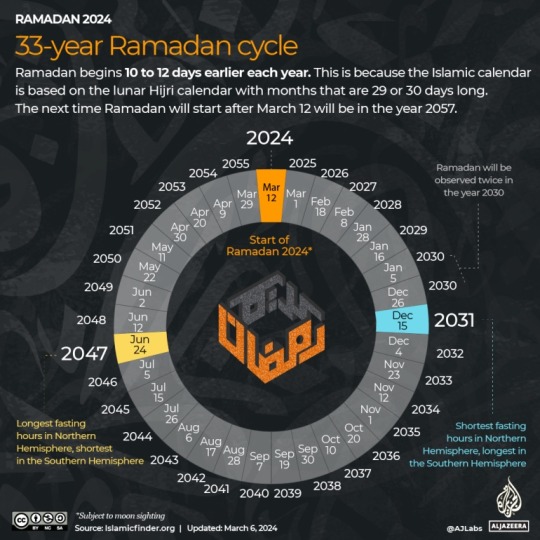
Fasting Hours Around The World
The number of daylight hours varies across the world.
Muslims living in the world’s southernmost countries, such as Chile or New Zealand, will fast for about 12 hours, while those living in northernmost countries, such as Iceland or Greenland, will have 17-plus hours fasts.
For Muslims living in the Northern Hemisphere, the number of fasting hours will be a bit shorter this year and will continue to decrease until 2031, which is the year Ramadan will encompass the winter solstice – the shortest day of the year. After that, fasting hours will increase until the summer solstice – the longest day of the year in the Northern Hemisphere.
For fasting Muslims living south of the equator, the opposite will happen.
In extreme northernmost cities, such as Longyearbyen in Norway, where the sun does not set from April 20 to August 22, religious rulings have been issued to follow timings in Mecca, Saudi Arabia, or the nearest Muslim country.
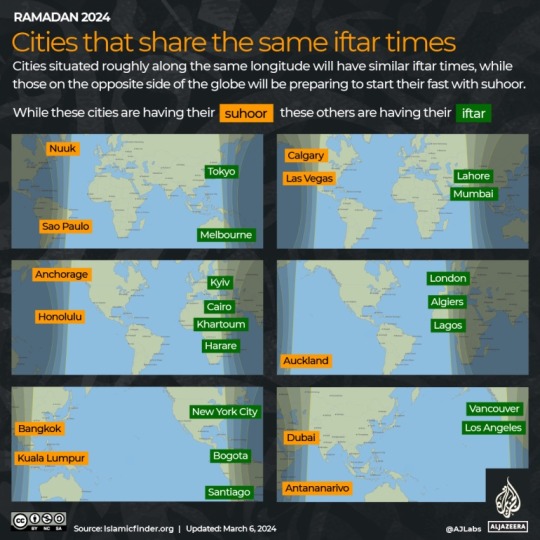
Cities That Share The Same Iftar Times
The predawn meal to start the daily fast is called suhoor, while the breaking of one’s fast after sunset is called iftar.
Cities situated roughly along the same longitude will have similar iftar times, while those on the opposite side of the globe will be preparing to start their fast with suhoor.
The infographic below shows which cities are having suhoor while others are having their iftar.
Fasting Times Around The World
The table below shows the suhoor and iftar times on the first and last days of Ramadan 2024. Use the arrows or search box to find your city.
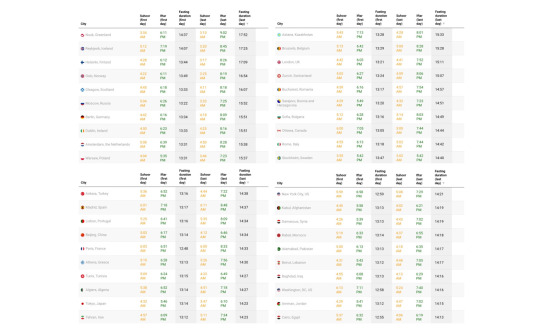
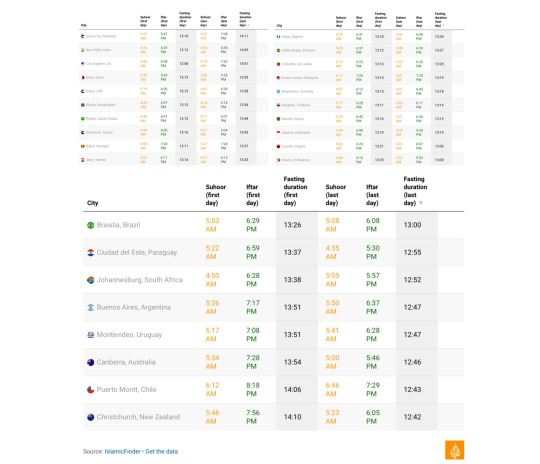
Which Cities Have The Longest And Shortest Fasting Hours?
Below are the average number of fasting hours in cities around the world. Actual fasting hours and times will vary by day, as well as calculation methods:
– Nuuk, Greenland 🇬🇱: 16 hours
– Reykjavik, Iceland 🇮🇸: 16 hours
– Helsinki, Finland 🇫🇮: 15 hours
– Oslo, Norway 🇳🇴: 15 hours
– Glasgow, Scotland 🏴: 15 hours
– Berlin, Germany 🇩🇪: 15 hours
– Dublin, Ireland 🇮🇪: 15 hours
– Moscow, Russia 🇷🇺: 15 hours
– Amsterdam, The Netherlands 🇳🇱: 15 hours
– Warsaw, Poland 🇵🇱: 15 hours
– Astana, Kazakhstan 🇰🇿: 15 hours
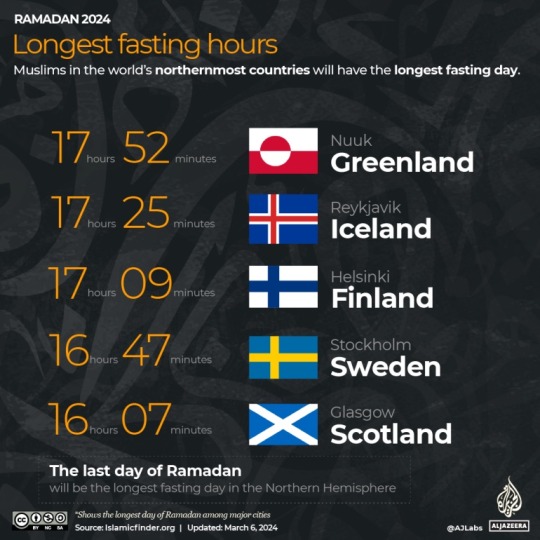
– Brussels, Belgium 🇧🇪: 14 hours
– London, UK 🇬🇧: 14 hours
– Zurich, Switzerland 🇨🇭: 14 hours
– Stockholm, Sweden 🇸🇪: 14 hours
– Bucharest, Romania 🇷🇴: 14 hours
– Sarajevo, Bosnia and Herzegovina 🇧🇦: 14 hours
– Sofia, Bulgaria 🇧🇬: 14 hours
– Rome, Italy 🇮🇹: 14 hours
– Madrid, Spain 🇪🇸: 14 hours
– Paris, France 🇫🇷: 14 hours
– Lisbon, Portugal 🇵🇹: 14 hours
– Ankara, Türkiye 🇹🇷: 14 hours
– Ottawa, Canada 🇨🇦: 14 hours
– Tokyo, Japan 🇯🇵: 14 hours
– Beijing, China 🇨🇳: 14 hours
– Athens, Greece 🇬🇷: 14 hours
– New York City, US 🇺🇸: 14 hours
– Washington, DC, US 🇺🇸: 14 hours
– Los Angeles, US 🇺🇸: 14 hours
– Tunis, Tunisia 🇹🇳: 14 hours
– Algiers, Algeria 🇩🇿: 14 hours
– Tehran, Iran 🇮🇷: 14 hours
– Kabul, Afghanistan 🇦🇫: 14 hours
– New Delhi, India: 14 hours
– Dhaka, Bangladesh 🇧🇩: 14 hours
– Rabat, Morocco 🇲🇦: 14 hours
– Damascus, Syria 🇸🇾: 14 hours
– Islamabad, Pakistan 🇵🇰: 14 hours
– Baghdad, Iraq 🇮🇶: 14 hours
– Beirut, Lebanon 🇱🇧: 14 hours
– Amman, Jordan 🇯🇴: 14 hours
– Gaza City, Forever Palestine 🇵🇸: 14 hours
– Cairo, Egypt 🇪🇬: 14 hours
– Doha, Qatar 🇶🇦: 13 hours
– Dubai, UAE 🇦🇪: 13 hours
– Khartoum, Sudan 🇸🇩: 13 hours
– Riyadh, Saudi Arabia 🇸🇦: 13 hours
– Abuja, Nigeria 🇳🇬: 13 hours
– Aden, Yemen 🇾🇪: 13 hours
– Dakar, Senegal 🇸🇳: 13 hours
– Addis Ababa, Ethiopia 🇪🇹: 13 hours
– Buenos Aires, Argentina 🇦🇷: 13 hours
– Colombo, Sri Lanka 🇱🇰: 13 hours
– Kuala Lumpur, Malaysia 🇲🇾: 13 hours
– Mogadishu, Somalia 🇸🇴: 13 hours
– Ciudad del Este, Paraguay 🇵🇾: 13 hours
– Nairobi, Kenya 🇰🇪: 13 hours
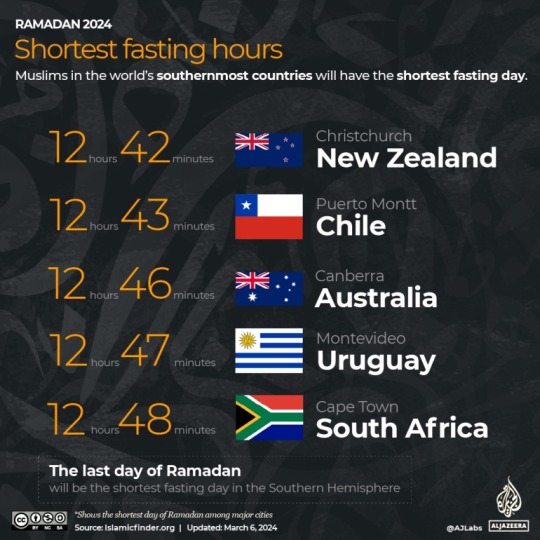
– Harare, Zimbabwe 🇿🇼: 13 hours
– Jakarta, Indonesia 🇮🇩: 13 hours
– Luanda, Angola 🇦🇴: 13 hours
– Bangkok, Thailand 🇹🇭: 13 hours
– Brasilia, Brazil 🇧🇷: 13 hours
– Johannesburg, South Africa 🇿🇦: 13 hours
– Montevideo, Uruguay 🇺🇾: 13 hours
– Canberra, Australia 🇦🇺: 13 hours
– Puerto Montt, Chile 🇨🇱: 13 hours
– Christchurch, New Zealand 🇳🇿: 13 hours
Ramadan Greetings In Different Languages
Various Muslim-majority nations have a personalised greeting in their native languages.
“Ramadan Mubarak” and “Ramadan Kareem” are the most common greetings exchanged in this period, wishing the recipient a blessed and generous month, respectively.
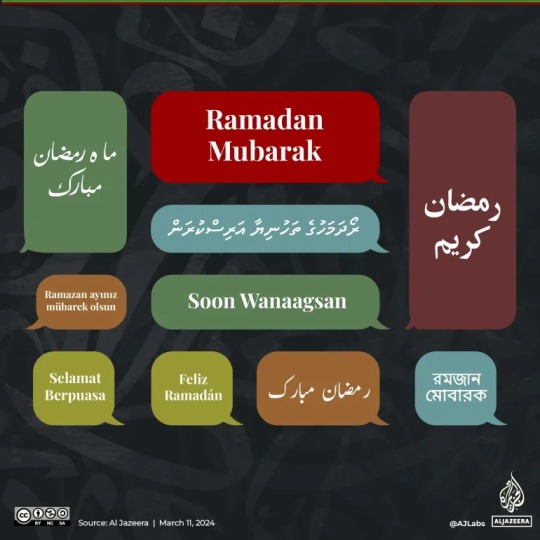
— SOURCE: AL JAZEERA
#Al-Jazeera#Ramadan#Ramadan Mubarak#Fasting#Fasting Around the Globe 🌎#Different Fasting Duration Around the World 🌎#Iftar Times All Around the Globe 🌎#Fasting Timings Around the Globe 🌎
0 notes
Text
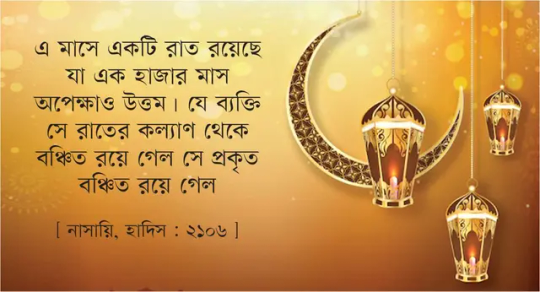
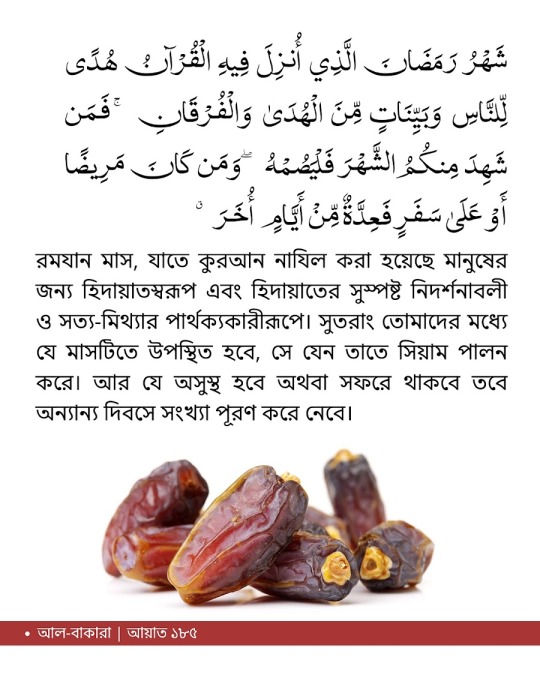

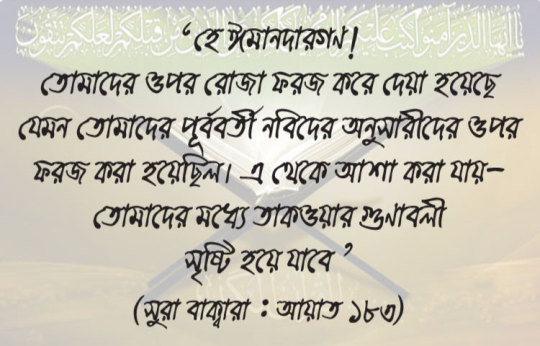
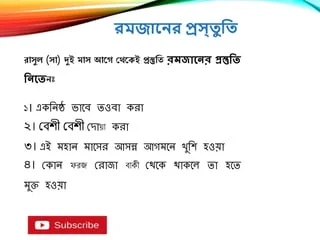

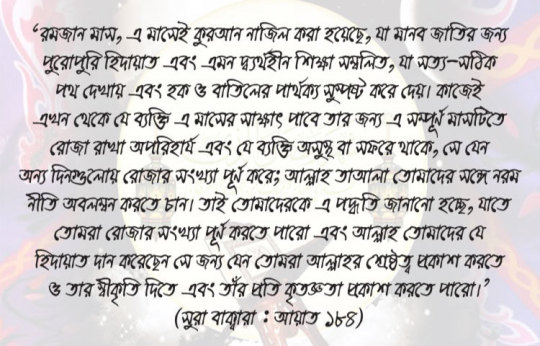
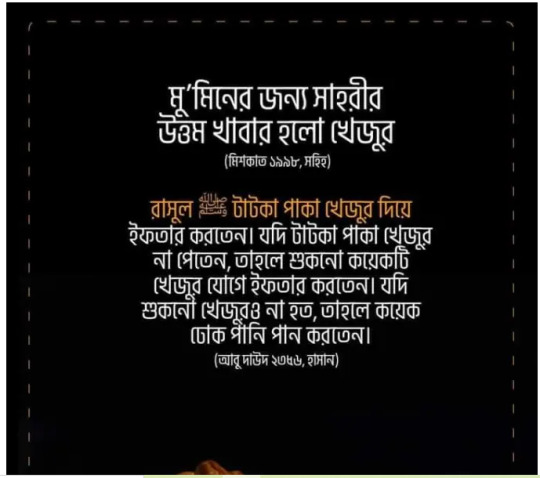
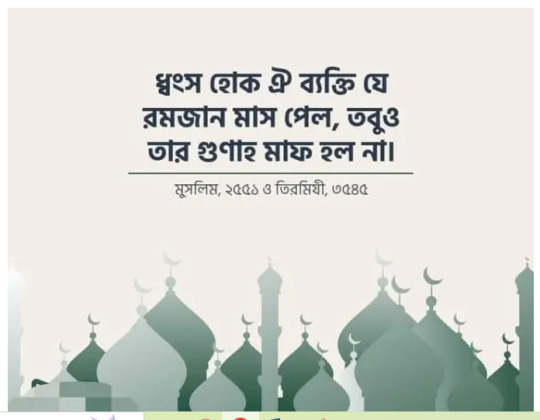
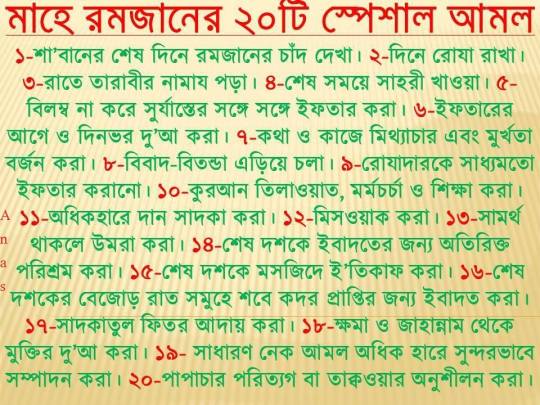
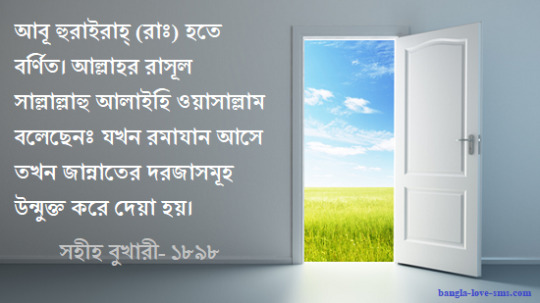
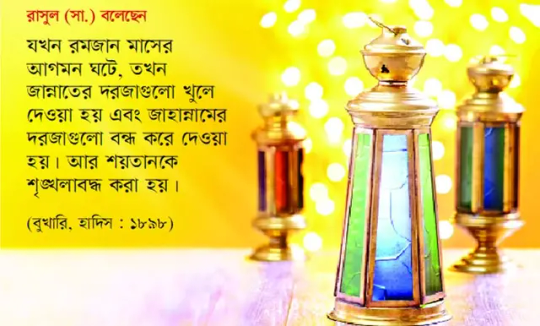
রমজান মাস সার্থক করতে আমল
রমজান মাস মুসলমানদের জন্য আল্লাহর তরফ থেকে এক বিশেষ রহমত স্বরূপ। কোরআন এবং হাদীসে এই রমজান সম্পর্কে সুস্পষ্ট বিধান রয়েছে।
প্রতিটি সক্ষম মুসলমান নর-নারীর ওপর এই মাসে রোজা বা সিয়াম সাধনা বাধ্যতামূলক করা হয়েছে, একই সঙ্গে এর অসংখ্য ফজিলত বর্ণনা করা হয়েছে কোরআন ও হাদীসে।
এক রেওয়াতে বর্ণনা করা হয়েছে, রোজাদারের পুরস্কার স্বয়ং আল্লাহ পাক প্রদান করবেন। অন্য এক হাদীসে বর্ণনা করা হয়েছে রোজা মুমিনের জন্য ঢাল স্বরূপ।
এই রমজান মাস আল্লাহর তরফ থেকে বান্দার জন্য রহমত, বরকত ও মাগফেরাত হিসেবে অভির্ভূত হয়।
হাদীস(সহীহ বোখারী, সহীহ তিরমিযি, ইমাম হাম্বলী, ইবনে কাসীর, প্রভৃতিবর্ণিত রয়েছে, বিশেষ করে সাহাবী ক্কাআব বিন ঊজাইর রাজি আল্লাহু তাআলা আনহু (রা.) থেকে বর্ণিত, একবার জুমার খুৎবা দেওয়ার জন্য রাসূলুল্লাহ সাল্লাল্লাহু আলাইহি ওয়াসাল্লাম (সা.) যখন মিম্বরের প্রথম সিঁড়িতে পা রাখেন, তখন বলেন আমীন, দ্বিতীয় সিঁড়িতে যখন পা রাখেন, তখন বলেন আমীন, একইভাবে তৃতীয় সিঁড়িতে পা রেখেও বলেন, আমীন।
কুরআনের কোন আয়াতে রোজা সম্পর্কে বলা হয়েছে?
কুরআনে। কুরআনে রোজা পালনের কথা বলা হয়েছে। আয়াত 2:183- এ, কুরআন এমন পরিস্থিতি প্রকাশ করে যেখানে একজন মুসলমানকে উপবাস থেকে বিরত থাকার অনুমতি দেওয়া হয় এবং অভাবী লোকদের খাওয়ানোর মতো বিকল্প সমাধানের প্রবর্তন করে।
রমজানের প্রস্তুতি
youtube
রমজানের ৬-৭দিন আগে রাসুল সাঃ যে আমল করতেন এবং যে আমল থেকে বিরত থাকতেন!
youtube
রমজান মাস সঙ্ক্রান্ত আয়াত
রমজান এবং রোজা সম্পর্কে কুরআনের আয়াত
রমজান এবং রোজা সম্পর্কে কুরআনের আয়াত
রমজান মাসের আমল
রমজানের প্রস্তুতি
QURANIC VERSES ABOUT RAMADAN AND FASTING
QURANICVERSES #RAMADAN #FASTING
#ramadan#fasting#Youtube#রমজান মাসের আমল#রমজানেরপ্রস্তুতি#QURANIC VERSES ABOUT RAMADAN AND FASTING#QURANICVERSES#RAMADAN#FASTING#Verses of Fasting and Ramadan#Qur'an#LailatulQadr#কুরআন#রমজান#রোজা#লাইলাতুলকদর#RamadanPreparation#Ramadan Month#Verses#monthofRamadan#Ramadan#Fasting#রমজানমাস
0 notes
Text
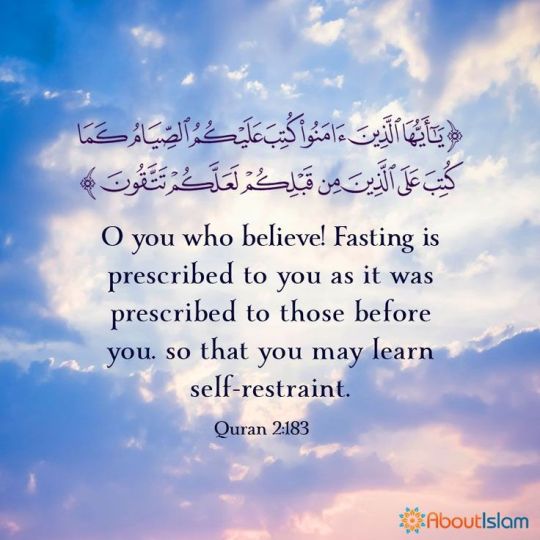
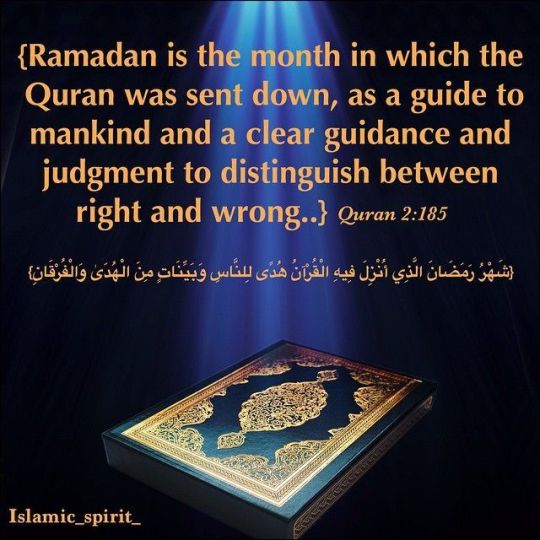
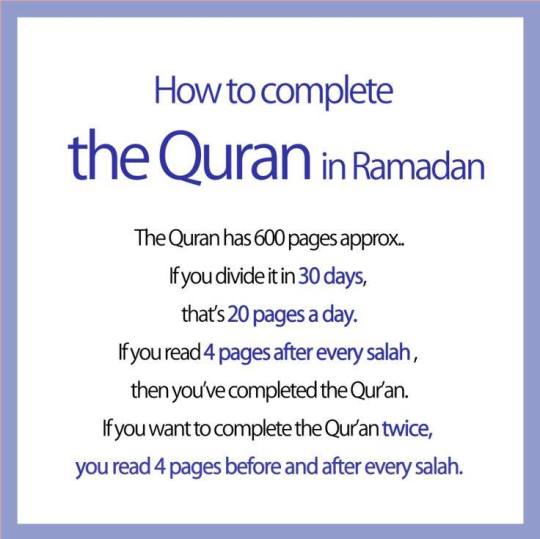
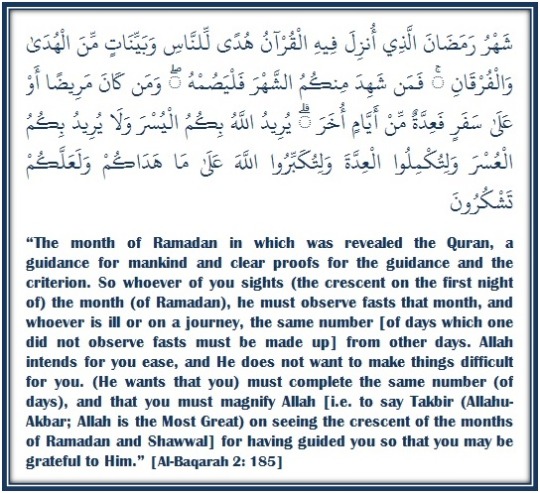
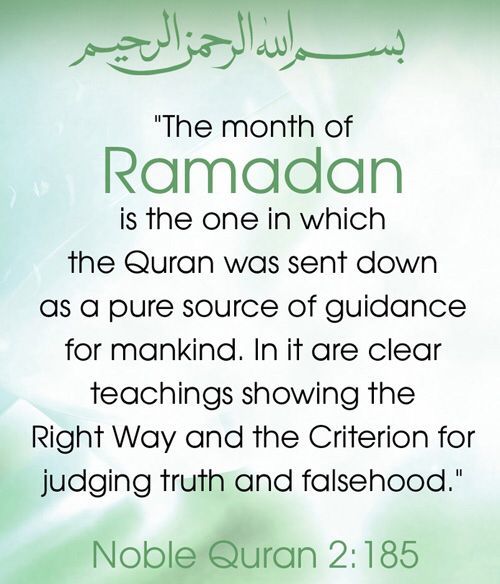
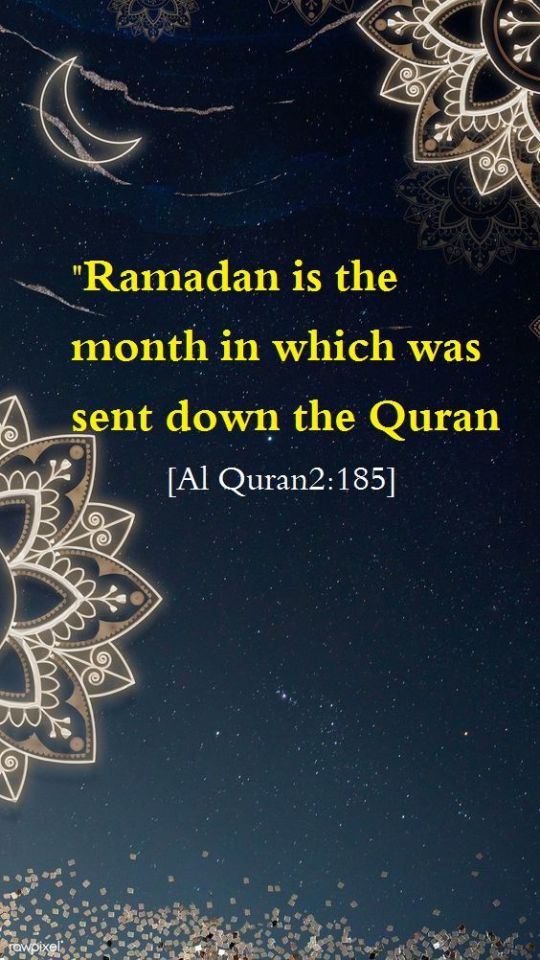
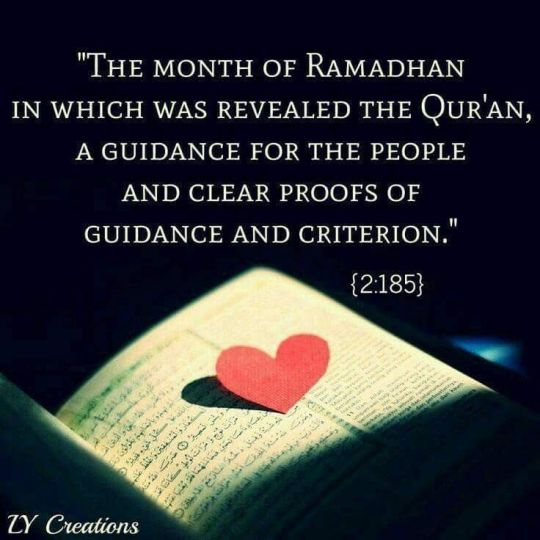
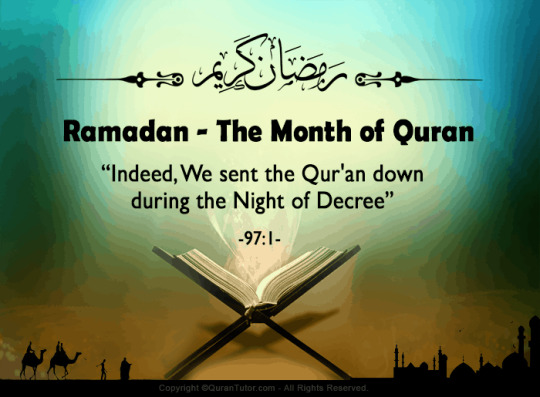
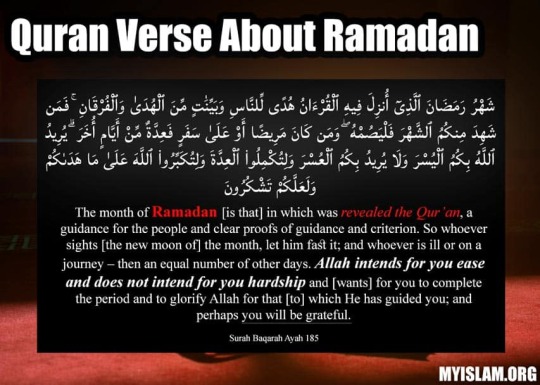

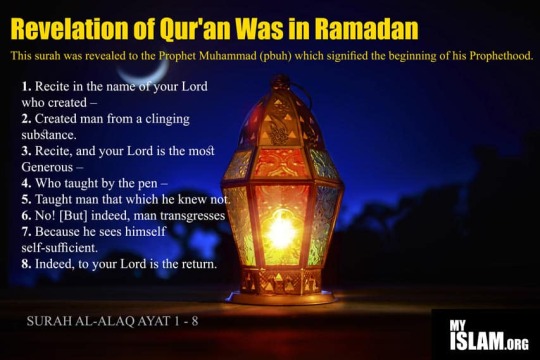
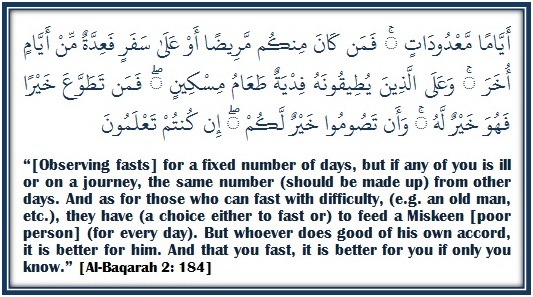
Which Quran verse talks about fasting?
In the Quran. In the Quran, the practice of fasting is mentioned. In verse 2:183, the Quran expresses situations in which a Muslim is allowed to abstain from fasting and introduces alternative solutions such as feeding needy people.
Which surah of Quran to read in Ramadan?
Since Ramadan is the month of the Qur'an, it is the perfect time to recite these Surahs, build a connection with them and even memorise them. You can listen to three of these 'Gems of the Qur'an' here: Surah Yasin, Surah Waqi'ah and Surah Mulk.
Surah Baqarah Ayah 185. The month of Ramadhan [is that] in which was revealed the Qur'an, a guidance for the people and clear proofs of guidance and criterion. So whoever sights [the new moon of] the month, let him fast it; and whoever is ill or on a journey – then an equal number of other days.
Verses about Ramadan
https://www.youtube.com/watch?v=ppqt8nLL-fs
https://www.youtube.com/watch?v=5TgveVWYRFQ
https://www.youtube.com/watch?v=LABS6xwNUaE
Fasting is Compulsory in Ramadhaan
https://www.youtube.com/watch?v=7tx7AOvTUPA
PHYSICAL AND PSYCHOLOGICAL BENEFITS OF FASTING
https://www.youtube.com/watch?v=Oc9n9spADUw
QURANIC VERSES ABOUT RAMADAN AND FASTING
Verses of Fasting and Ramadan
#ramadan#QURANIC VERSES ABOUT RAMADAN AND FASTING#Verses of Fasting and Ramadan#RamadanPreparation#Verses about Ramadan#Ramadan Month#Verses#monthofRamadan#Ramadan#Fasting#QURANICVERSES#RAMADAN#FASTING#Qur'an#LailatulQadr#কুরআন#রমজান#রোজা#লাইলাতুলকদর
0 notes
Text
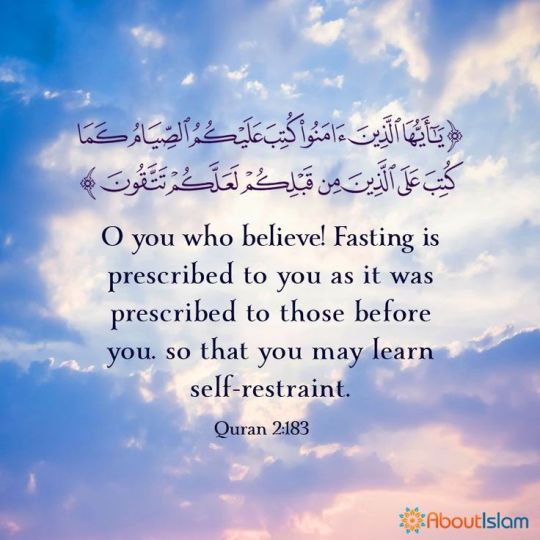
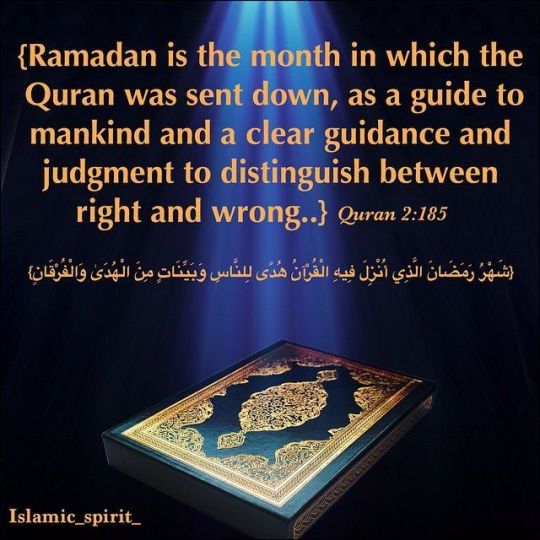
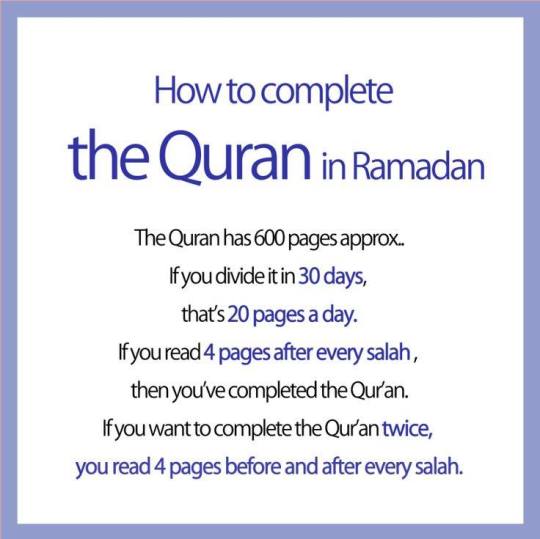

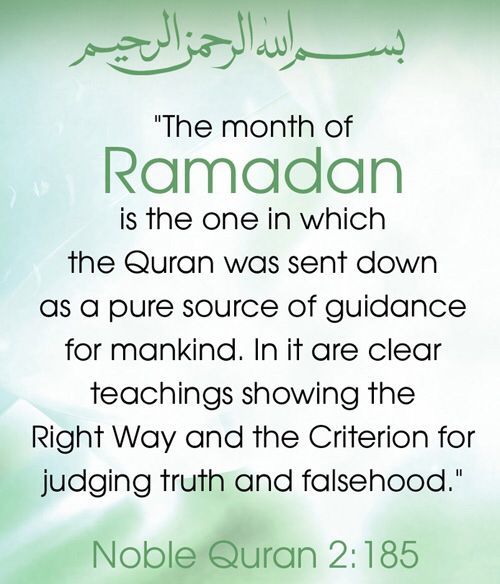

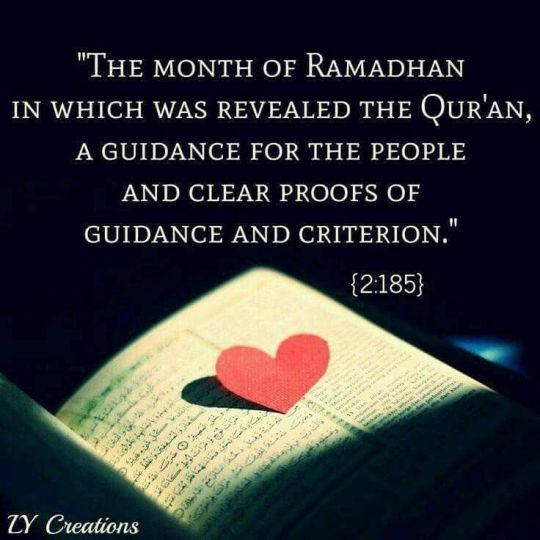
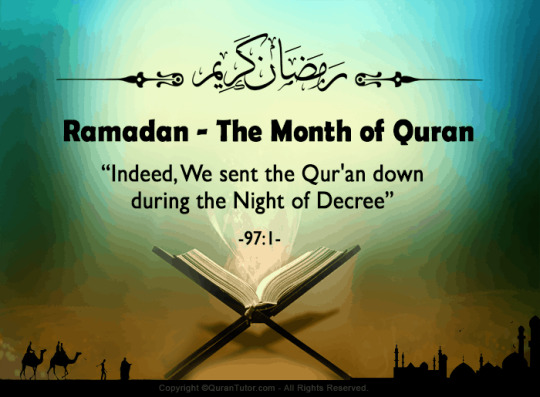

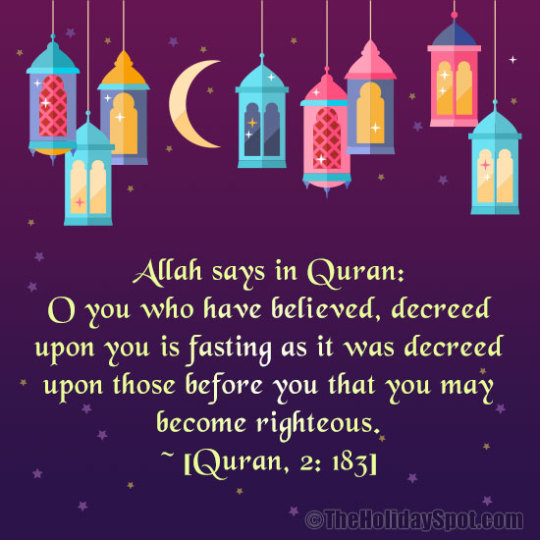
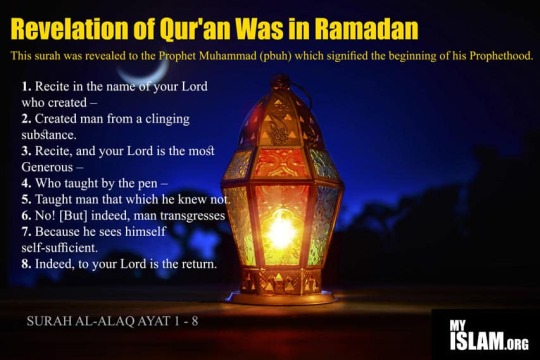
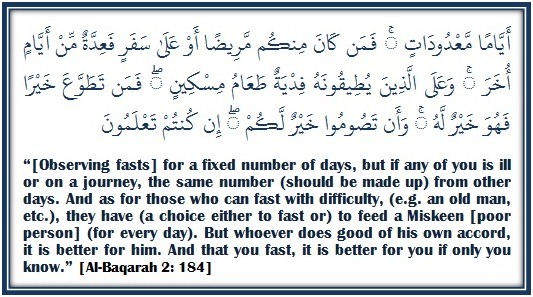
Which Quran verse talks about fasting?
In the Quran. In the Quran, the practice of fasting is mentioned. In verse 2:183, the Quran expresses situations in which a Muslim is allowed to abstain from fasting and introduces alternative solutions such as feeding needy people.
Which surah of Quran to read in Ramadan?
Since Ramadan is the month of the Qur'an, it is the perfect time to recite these Surahs, build a connection with them and even memorise them. You can listen to three of these 'Gems of the Qur'an' here: Surah Yasin, Surah Waqi'ah and Surah Mulk.
Surah Baqarah Ayah 185. The month of Ramadhan [is that] in which was revealed the Qur'an, a guidance for the people and clear proofs of guidance and criterion. So whoever sights [the new moon of] the month, let him fast it; and whoever is ill or on a journey – then an equal number of other days.
Verses about Ramadan
https://www.youtube.com/watch?v=ppqt8nLL-fs
https://www.youtube.com/watch?v=5TgveVWYRFQ
https://www.youtube.com/watch?v=LABS6xwNUaE
Fasting is Compulsory in Ramadhaan
https://www.youtube.com/watch?v=7tx7AOvTUPA
PHYSICAL AND PSYCHOLOGICAL BENEFITS OF FASTING
https://www.youtube.com/watch?v=Oc9n9spADUw
QURANIC VERSES ABOUT RAMADAN AND FASTING
Verses of Fasting and Ramadan
#ramadan#QURANIC VERSES ABOUT RAMADAN AND FASTING#Verses of Fasting and Ramadan#RamadanPreparation#Verses about Ramadan#Ramadan Month#Verses#monthofRamadan#Ramadan#Fasting#QURANICVERSES#RAMADAN#FASTING#Qur'an#LailatulQadr#কুরআন#রমজান#রোজা#লাইলাতুলকদর#islam
0 notes
Text
Tips for Practicing Patience in Islamic Creed by Waiel Shihadeh (Shreveport)
Waiel Shihadeh Shreveport
Tips for Practicing Patience in Islamic Creed by Waiel Shihadeh (Shreveport)
Practicing patience is an essential aspect of Islamic creed, as it is emphasized in various teachings and scriptures. Patience, or "sabr" in Arabic, is often described as a virtue that allows individuals to endure trials and tribulations while remaining steadfast in their faith. In Islam, patience is not merely about waiting passively, but it involves actively maintaining composure, perseverance, and trust in Allah's wisdom and plan. In this blog, we will explore some practical tips with the help of believers like Waiel Shihadeh (Shreveport) for cultivating and practicing patience within the Islamic creed.
Understanding the Concept of Patience
To effectively practice patience in Islamic creed, it is crucial to have a clear understanding of what patience entails. Patience involves restraining oneself from despair and hasty actions during challenging times. It requires accepting the decree of Allah with contentment and surrendering to His will. Understanding that trials are a test of faith and an opportunity for spiritual growth can help in cultivating patience.
Additionally, patience in Islam extends beyond personal struggles to encompass interactions with others. It involves showing forbearance and tolerance towards fellow human beings, even in the face of adversity or disagreement. By internalizing the concept of patience with the help of believers like Waiel Shihadeh (Shreveport), individuals can approach life's challenges with a balanced and resilient mindset.
Seeking Guidance from the Quran and Sunnah
The Quran and Sunnah serve as the primary sources of guidance for Muslims in all aspects of life, including patience. Numerous verses in the Quran highlight the importance of patience and its rewards for believers. For example, Allah says in Surah Al-Baqarah (2:153), "O you who have believed, seek help through patience and prayer. Indeed, Allah is with the patient."
Similarly, the life of the Prophet Muhammad (peace be upon him) provides exemplary models of patience in the face of adversity. His perseverance during times of hardship, such as the early years of Islam in Makkah, serves as a source of inspiration for Muslims worldwide. By studying the Quranic verses and Hadiths related to patience with the help of believers like Waiel Shihadeh (Shreveport), individuals can gain insights into its significance and practical application in their lives.
Cultivating Taqwa
Taqwa, often translated as God-consciousness or piety, is a fundamental concept in Islam that goes hand in hand with patience. Cultivating taqwa involves being mindful of Allah's presence in all aspects of life and striving to obey His commandments. By developing a strong sense of taqwa, individuals can better navigate through challenges while maintaining patience and resilience.
One way to cultivate taqwa is through consistent acts of worship, such as performing the five daily prayers, observing fasting during Ramadan, giving charity, and reciting the Quran. These acts not only strengthen one's connection with Allah but also instill a sense of discipline and self-control, which are essential components of patience.
Additionally, practicing mindfulness and self-reflection can help individuals become more aware of their thoughts, emotions, and actions, allowing them to respond to challenging situations with patience and wisdom. By prioritizing taqwa in their daily lives with the help of believers like Waiel Shihadeh (Shreveport), Muslims can enhance their ability to endure trials with patience and trust in Allah's plan.
Developing Gratitude
Gratitude, or "shukr" in Arabic, is another important trait that complements patience in Islamic creed. Expressing gratitude to Allah for His blessings, regardless of the circumstances, fosters a positive mindset and strengthens one's faith. Instead of focusing solely on hardships, Muslims are encouraged to reflect on the numerous blessings bestowed upon them and be thankful for them.
Practicing gratitude can be as simple as reciting morning and evening supplications (duas) that express gratitude to Allah for His blessings, health, and provisions. Additionally, keeping a gratitude journal or regularly reflecting on one's blessings can help shift focus away from difficulties towards the abundance of Allah's mercy and kindness.
Surrounding Oneself with Supportive Communities
In times of trial and tribulation, having a supportive community can provide invaluable comfort and encouragement. Islam places great emphasis on fostering strong bonds within the Muslim community (ummah) and supporting one another during challenging times. Surrounding oneself with supportive friends, family members, and mentors who share similar values and beliefs can help alleviate feelings of loneliness and despair.
Engaging in acts of kindness and charity within the community can also strengthen social ties and build resilience collectively. By participating in community service projects, supporting those in need, and offering words of encouragement to fellow Muslims with the help of believers like Waiel Shihadeh (Shreveport), individuals can contribute to the overall well-being of the community while drawing strength from its collective support.
Making Dua
Finally, making dua, or supplication, is a powerful tool for seeking Allah's guidance, mercy, and assistance during times of difficulty. Muslims are encouraged to turn to Allah in prayer and seek His help with sincerity and humility. Whether facing personal challenges or witnessing hardship in the world, making dua serves as a means of connecting with Allah and seeking solace in His infinite wisdom and compassion.
In addition to personal supplications, Muslims can also collectively make dua during congregational prayers, especially during times of communal distress or calamity. The Prophet Muhammad (peace be upon him) emphasized the importance of dua and its efficacy in bringing about positive change. By turning to Allah in times of need and placing their trust in His divine decree, believers can find strength and patience to endure life's trials.
Practising patience in Islamic creed requires a combination of understanding, faith, and practical strategies. By cultivating a deeper understanding of patience, seeking guidance from the Quran and Sunnah, developing taqwa, expressing gratitude, surrounding oneself with supportive communities, and making dua, Muslims can strengthen their ability to endure hardships with patience and trust in Allah's plan. In the face of life's challenges, may we all strive to embody the virtues of patience and perseverance as taught by Islam.
0 notes
Text














রমজান মাস সার্থক করতে আমল
রমজান মাস মুসলমানদের জন্য আল্লাহর তরফ থেকে এক বিশেষ রহমত স্বরূপ। কোরআন এবং হাদীসে এই রমজান সম্পর্কে সুস্পষ্ট বিধান রয়েছে।
প্রতিটি সক্ষম মুসলমান নর-নারীর ওপর এই মাসে রোজা বা সিয়াম সাধনা বাধ্যতামূলক করা হয়েছে, একই সঙ্গে এর অসংখ্য ফজিলত বর্ণনা করা হয়েছে কোরআন ও হাদীসে।
এক রেওয়াতে বর্ণনা করা হয়েছে, রোজাদারের পুরস্কার স্বয়ং আল্লাহ পাক প্রদান করবেন। অন্য এক হাদীসে বর্ণনা করা হয়েছে রোজা মুমিনের জন্য ঢাল স্বরূপ।
এই রমজান মাস আল্লাহর তরফ থেকে বান্দার জন্য রহমত, বরকত ও মাগফেরাত হিসেবে অভির্ভূত হয়।
হাদীস(সহীহ বোখারী, সহীহ তিরমিযি, ইমাম হাম্বলী, ইবনে কাসীর, প্রভৃতিবর্ণিত রয়েছে, বিশেষ করে সাহাবী ক্কাআব বিন ঊজাইর রাজি আল্লাহু তাআলা আনহু (রা.) থেকে বর্ণিত, একবার জুমার খুৎবা দেওয়ার জন্য রাসূলুল্লাহ সাল্লাল্লাহু আলাইহি ওয়াসাল্লাম (সা.) যখন মিম্বরের প্রথম সিঁড়িতে পা রাখেন, তখন বলেন আমীন, দ্বিতীয় সিঁড়িতে যখন পা রাখেন, তখন বলেন আমীন, একইভাবে তৃতীয় সিঁড়িতে পা রেখেও বলেন, আমীন।
কুরআনের কোন আয়াতে রোজা সম্পর্কে বলা হয়েছে?
কুরআনে। কুরআনে রোজা পালনের কথা বলা হয়েছে। আয়াত 2:183- এ, কুরআন এমন পরিস্থিতি প্রকাশ করে যেখানে একজন মুসলমানকে উপবাস থেকে বিরত থাকার অনুমতি দেওয়া হয় এবং অভাবী লোকদের খাওয়ানোর মতো বিকল্প সমাধানের প্রবর্তন করে।
রমজানের প্রস্তুতি
youtube
রমজানের ৬-৭দিন আগে রাসুল সাঃ যে আমল করতেন এবং যে আমল থেকে বিরত থাকতেন!
youtube
#রমজান মাস সঙ্ক্রান্ত আয়াত
#রমজান এবং রোজা সম্পর্কে কুরআনের আয়াত
#রমজান এবং রোজা সম্পর্কে কুরআনের আয়াত
রমজান মাসের আমল
রমজানের প্রস্তুতি
QURANIC VERSES ABOUT RAMADAN AND FASTING
0 notes
Text
Indulge in the Rich Customs of Ramadan: A Comprehensive Guide to Fasting and Feasting
If the language of food could express love, then the ritual of iftar during Ramadan would be its most enchanting sonnet—for your appetite and your heart alike. As the sacred month of Ramadan nears its conclusion, the tantalizing aromas wafting through every street corner will be dearly missed. Laden with the authentic flavors of Indian, Persian, Arabic, Lebanese, and Egyptian cuisine, this annual celebration is eagerly anticipated by many. But why do people fast during this holy month, and what are the nuances of the Ramadan fast? Let's delve into these questions and more in this guide.
Ramadan, the ninth month in the Islamic calendar, holds a special place as a sacred time of reflection and devotion. Muslims believe that during this month, the first verses of the Quran were revealed to Prophet Mohammad while he observed a fast. It is a period characterized by self-control, compassion, patience, and abstinence.
Fasting during Ramadan follows a set of strict rules:
Abstaining from food and drink, including water, from sunrise to sunset.
No smoking or consumption of alcohol.
Breaking the fast at sunset, typically with one or three dates and a few sips of water.
Intermittent Fasting Insights
As Ramadan culminates with Eid-ul-Fitr, those conscious of their health and weight may find valuable principles in the fasting practices to incorporate into their daily lives. Adopting a pattern of consuming small, well-balanced meals during fixed periods of the day can align with the concept of intermittent fasting. However, remember that maintaining proper hydration remains crucial, even if water intake is restricted during the fasting period.
Suhoor - The Commencement of the Day
Suhoor, also known as sehri, is a substantial, energy-packed meal consumed early in the morning before sunrise, ironically considered by many as the "last" meal of the day. To fuel your day effectively, consider including these healthy options rich in complex carbohydrates and proteins:
Pulses like moong, matki, and chana.
Plain curd or dahi.
Fruits paired with curd.
Water-based foods like watermelon, strawberries, and cucumber.
Dairy products such as cheese, paneer, buttermilk, and alternative options like oatmilk, pea milk, or almond milk for vegans or those with lactose intolerance.
Nutritious choices like oatmeal, mango smoothies, peanut butter and banana smoothies, boiled eggs, boiled chicken with vegetables, and whole fruits and nuts. Enhance your oatmeal and smoothies with watermelon, pumpkin, sunflower, and chia seeds for added nutrition.
Iftar - A Feast for the Senses
If you've had the privilege of attending an Iftar gathering, you know that every corner of the table is laden with delectable dishes and beverages that can make your heart sing. After over 12 hours of fasting, the first dish you encounter may seem irresistible, but it's important to pay attention to tradition.
Muslims traditionally break their fast with one or three dates accompanied by a few sips of water, following the practice believed to be followed by the Prophet centuries ago. This method is not only nutritionally sound but also helps stabilize blood sugar levels.
But what about the sumptuous kebabs, biryani, and sheer khurma that often grace the Iftar table?
In short, yes! Iftar is indeed a culinary delight for your palate (and your heart)! Here's how to embark on your gastronomic journey during an Iftar celebration:
Begin with Soups: Soups featuring lentils, chicken, vermicelli, and various vegetables are common during Ramadan.
Refreshing Start: Rejuvenate your metabolism with plenty of fluids, water-based fruits, and refreshing drinks like thandai, lemonade, and Rooh Afza.
Explore Fattoush: Fattoush, a delicious combination of fresh veggies, topped with bread, olive oil, and pomegranate molasses, is a mouthwatering delight.
The Main Course: Delight in stews, kebabs, stuffed vegetables, meats (including chicken and fish), beans, dairy products, and bread, including the renowned biryani.
Don't Forget Haleem: Originating in Arabia, Haleem is a rich concoction of ghee, meats, rice, whole pulses, and local spices. In India, the best Haleem can be found in the streets and homes of Hyderabad during Ramadan.
Sweet Endings: Conclude your feast on a sweet note with Sevaiiyan, sheer khurma, and the show-stopping Kellaj. Kellaj, derived from Lebanon, features pastry dough filled with ashta (clotted cream), fried, drizzled with sugar syrup, garnished with ground pistachios, and adorned with candied orange blossom.
As we conclude this guide, we hope you savor the delightful flavors of Ramadan and its rich traditions before the holy month comes to an end. Eid Mubarak from Team Thinking Forks!
0 notes